Nebraska Documents
Quitclaim Deed
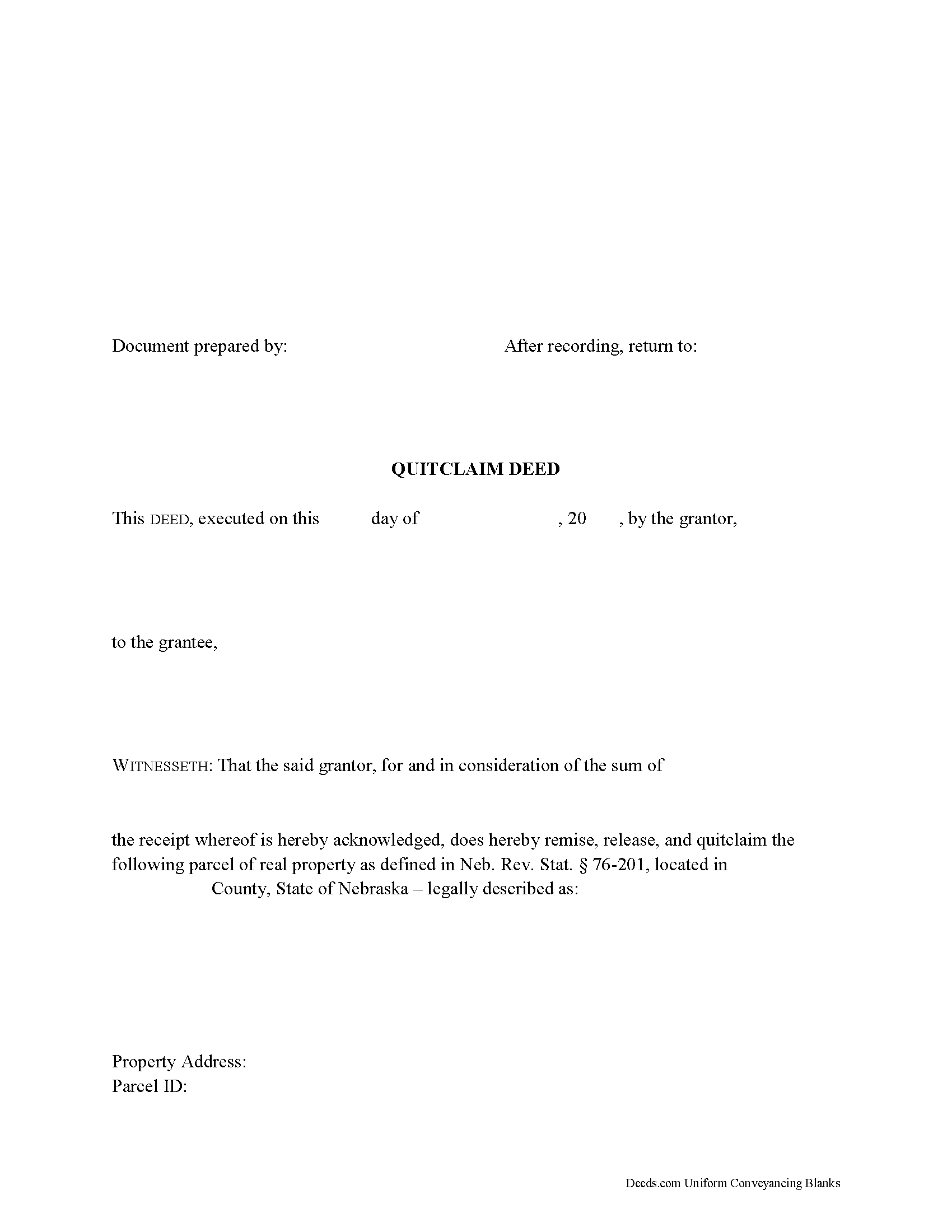
In Nebraska, real property can be transferred from one party to another by executing a quitclaim deed. Quitclaim deeds are accepted, but not statutory in Nebraska.
A quitclaim deed offers no warranties of title. It does not guarantee that the grantor has good title or ownership of the property, and only transfer the grantor's interest, if any, at the time of execution. They are typically used for transfers between family members, in divorce proceedings or other transfers of property pursuant to court order, or to clear title.
A lawful quitclaim deed includes the grantor's full name, mailing address, and marital status, and the grantee's full name, mailing address, marital status, and vesting. Vesting describes how the grantee holds title to the property. Generally, real property is owned in either sole ownership or in co-ownership. For Nebraska residential property, the primary methods for holding title are tenancy in common and joint tenancy. A grant of ownership of real estate to two or more persons is presumed to create a tenancy in common, unless a joint tenancy is expressly stated (Neb. Rev. Stat. 76-118).
As with any conveyance of realty, a quitclaim deed requires ... More Information about the Nebraska Quitclaim Deed
Gift Deed
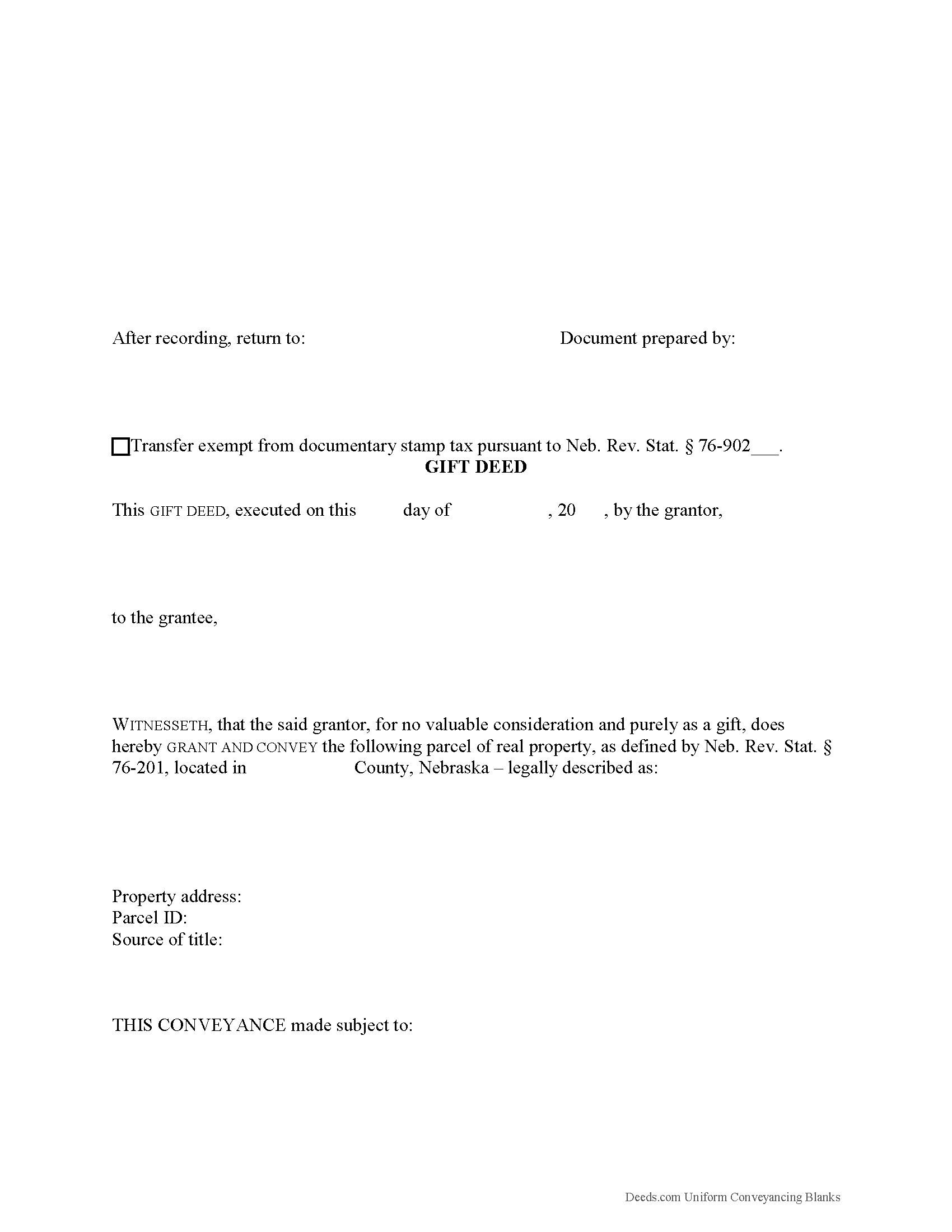
Gifts of Real Property in Nebraska
A gift deed, or deed of gift, is a legal document voluntarily transferring title to real property from one party (the grantor or donor) to another (the grantee or donee). A gift deed typically transfers real property between family or close friends. Gift deeds are also used to donate to a non-profit organization or charity. The deed serves as proof that the transfer is indeed a gift and without consideration (any conditions or form of compensation).
Valid deeds must meet the following requirements: The grantor must intend to make a present gift of the property, the grantor must deliver the property to the grantee, and the grantee must accept the gift. Gift deeds must contain language that explicitly states no consideration is expected or required, because any ambiguity or reference to consideration can make the deed contestable in court. A promise to transfer ownership in the future is not a gift, and any deed that does not immediately transfer the interest in the property, or meet any of the aforementioned requirements, can be revoked [1].
A lawful gift deed must also include the grantor's full name and marital status, as well as the ... More Information about the Nebraska Gift Deed
Warranty Deed
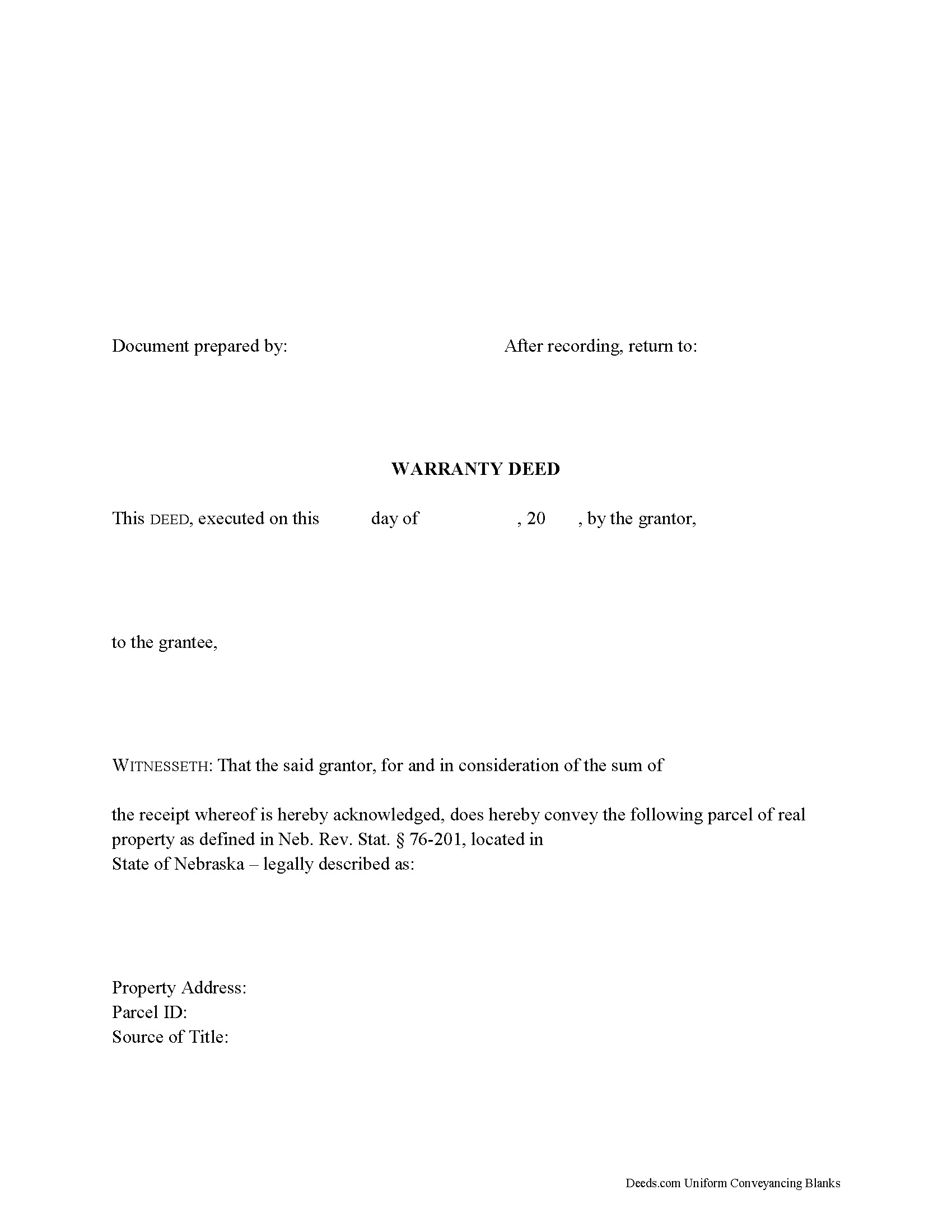
In Nebraska, real property can be transferred from one party to another by executing a warranty deed. These instruments are accepted, but not statutory in Nebraska, and are commonly used for sales of residential real estate.
Warranty deeds provide a high level of protection for the buyer (grantee). In addition to the covenants of a grant deed as set forth at Neb. Rev. Stat. 76-206, (that the grantor has good title to the estate in quantity and quality which he purports to convey), the grantor asserts that the title is free of any encumbrances (except for those stated in the deed); and that the grantor will warrant and defend the title against the lawful claims of all persons, even if the claim originates from a time before the current grantor owned the property.
A lawful warranty deed includes the grantor's full name, mailing address, and marital status, and the grantee's full name, mailing address, marital status, and vesting. Vesting describes how the grantee holds title to the property. Generally, real property is owned in either sole ownership or in co-ownership. For Nebraska residential property, the primary methods for holding title are tenancy in common and joint ten... More Information about the Nebraska Warranty Deed
Special Warranty Deed
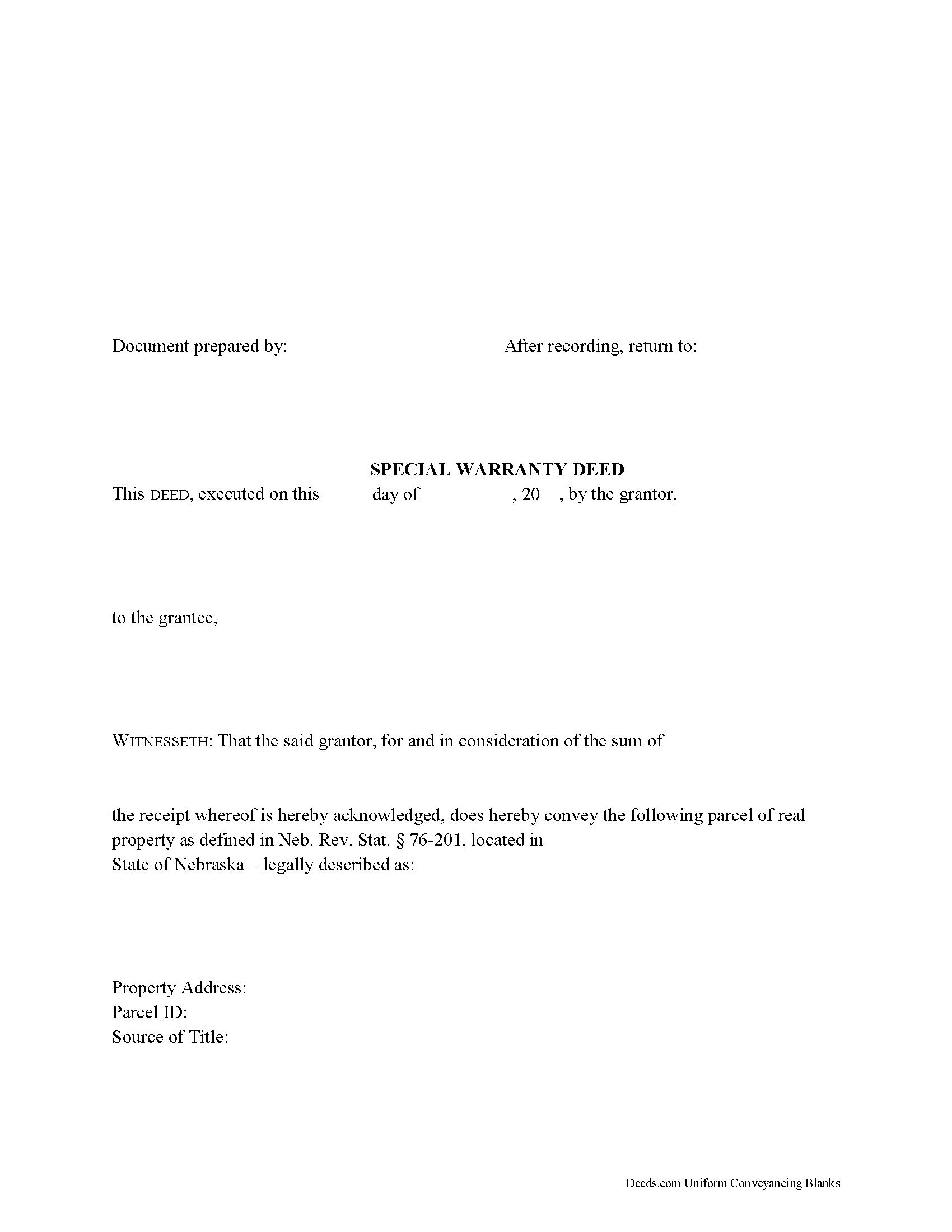
In Nebraska, real property can be transferred from one party to another by executing a special (or limited) warranty deed. These instruments are accepted but not statutory in Nebraska. Special warranty deeds convey an interest in real property to the named grantee with covenants that the title is free of any encumbrances (except for those stated in the deed); that the grantor holds an interest in the property and is free to convey it; and that the grantor will warrant and defend the title against the lawful claims and demands of all persons claiming by, through, or under the grantor, but none other. In short, a special warranty deed affirms that the grantor took no action to restrict or harm the title while they owned the property, but makes no promises about what happened before then.
A lawful special warranty deed includes the grantor's full name, mailing address, and marital status, and the grantee's full name, mailing address, marital status, and vesting. Vesting describes how the grantee holds title to the property. Generally, real property is owned in either sole ownership or in co-ownership. For Nebraska residential property, the primary methods for holding title are tena... More Information about the Nebraska Special Warranty Deed
Grant Deed
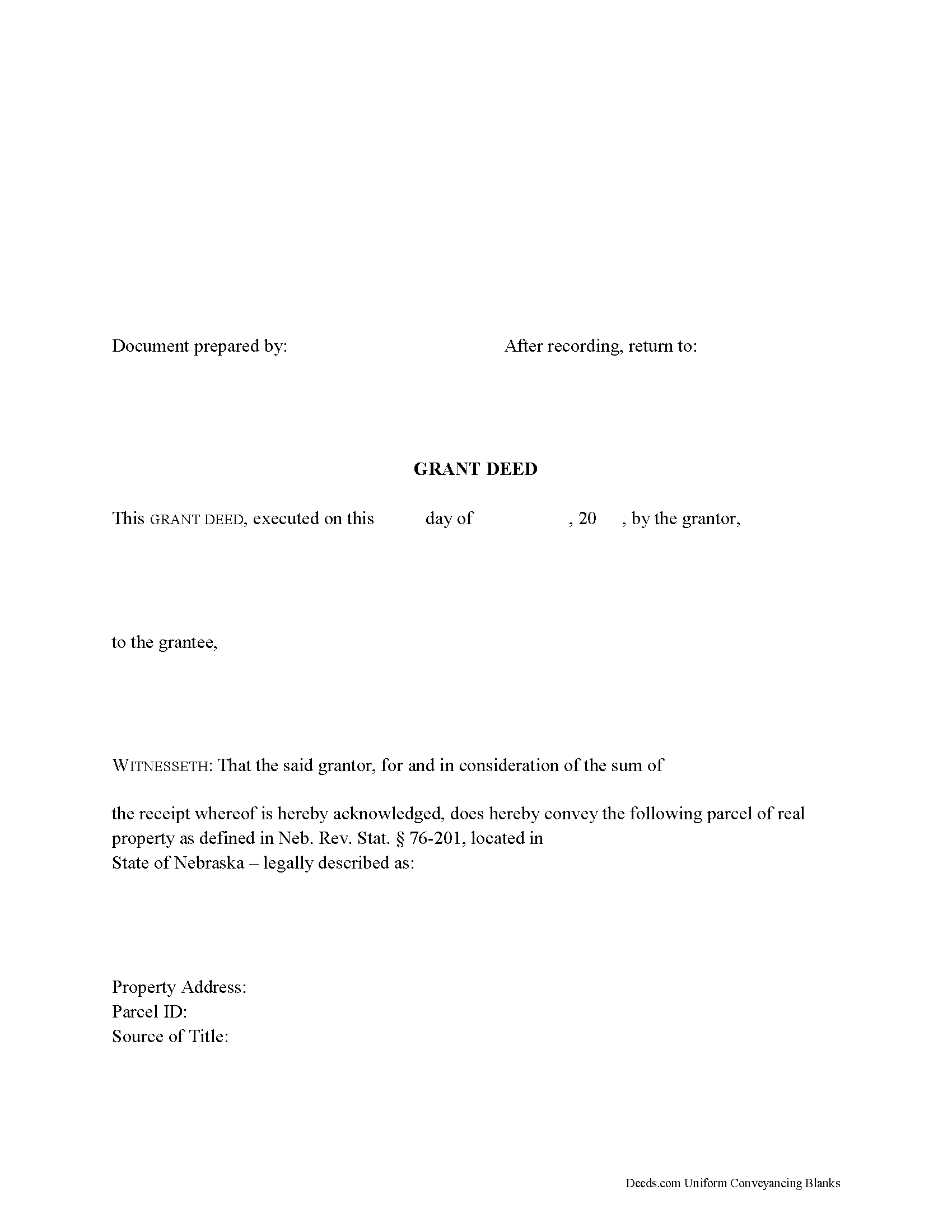
Real property can be transferred from one party to another by executing a grant deed. Nebraska's statutory grant deed includes a covenant that the grantor has good title to the estate in quantity and quality which he purports to convey (Neb. Rev. Stat. 76-206).
A lawful grant deed includes the grantor's full name, mailing address, and marital status, and the grantee's full name, mailing address, marital status, and vesting. Vesting describes how the grantee holds title to the property. Generally, real property is owned in either sole ownership or in co-ownership.
For Nebraska residential property, the primary methods for holding title are tenancy in common and joint tenancy. A grant of ownership of real estate to two or more persons is presumed to create a tenancy in common, unless a joint tenancy is expressly stated (Neb. Rev. Stat. 76-118).
As with any conveyance of realty, a grant deed requires a complete legal description of the parcel. Recite the prior deed reference to maintain a clear chain of title, detail any restrictions associated with the property, and indicate whether the property is a homestead. The deed must meet all state and local standards of form and con... More Information about the Nebraska Grant Deed
Correction Deed
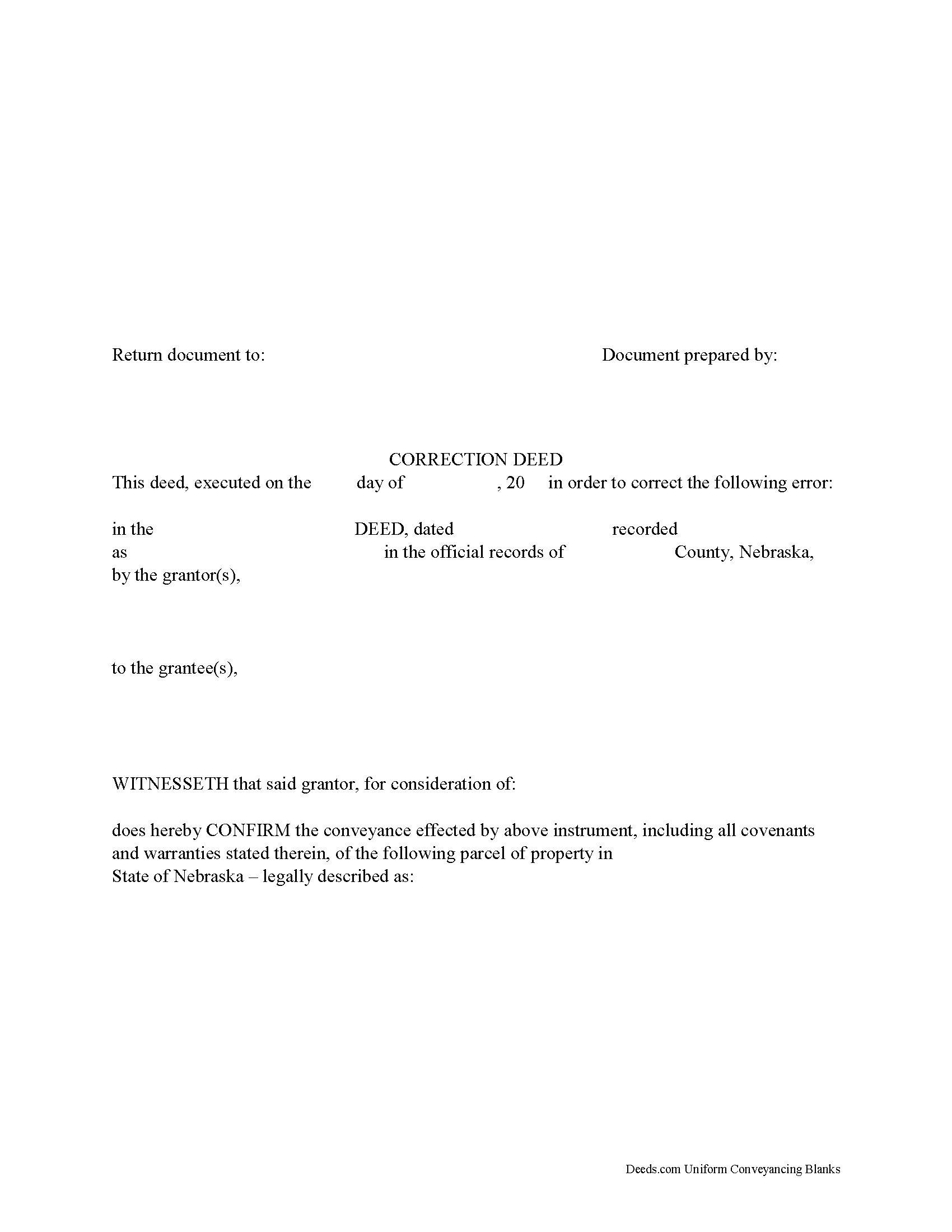
Use the correction deed to amend a previously recorded warranty, special warranty, or quitclaim deed.
A correction deed explains and corrects an error in a prior instrument; it is especially important if such an error might cloud the title and affect its future transfers. The correction deed passes no title, but reiterates and confirms the conveyance effected by the previously recorded document. Therefore, it must be executed from the original grantor to the original grantee and recorded in order to be legally valid.
The correction deed should reference the prior conveyance by type of error, date of execution, date of recording, as well as by recording number and location. Beyond that, it restates the information given in the prior deed, thus serving as its confirmation. The original instrument remains on record as well.
Deeds of correction are most appropriate for minor errors and omissions in the original deed, such as misspelled names, omission of marital status, or typos in the legal description. More substantial changes, such as adding a name to the title or adding/subtracting a portion of land to the legal description of the property, usually require a new deed of c... More Information about the Nebraska Correction Deed
Easement Deed
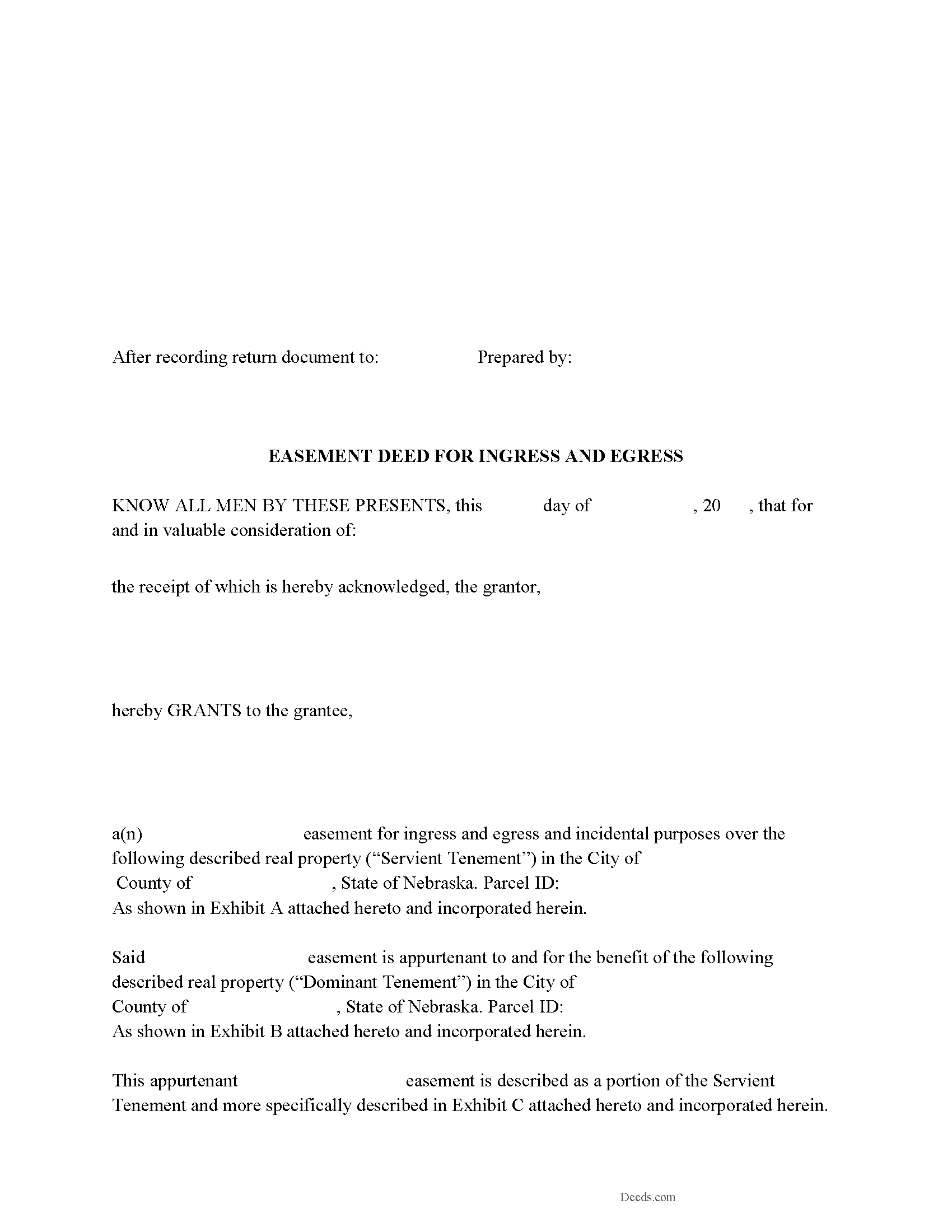
An easement is an interest in real property that allows one person to use another person's property for a specific purpose. An easement deed is the instrument that creates the right to use another's property. Easements can be created to benefit a dominant estate and will run with the land, or they can be created to benefit an individual or a legal entity. The terms of the easement should be contained in the easement deed.
A conservation or preservation easement is an interest in real property and is created by an instrument in which the purpose for the easement is clearly stated. This type of easement is not effective until it is accepted by the holder. Conservation or preservation easements are recorded, filed, and indexed in the office of the register of deeds in the county where the property subject to the easement is located (76-2,112).
In order for an easement deed to be considered lawfully recorded, it must be acknowledged or proved in the manner prescribed by Nebraska Revised Statutes (76-241). If executed in Nebraska, the easement deed must be signed by the grantor or grantors, be acknowledged or proved, and recorded. Acknowledgments must be done in accordance with s... More Information about the Nebraska Easement Deed
Termination of Easement
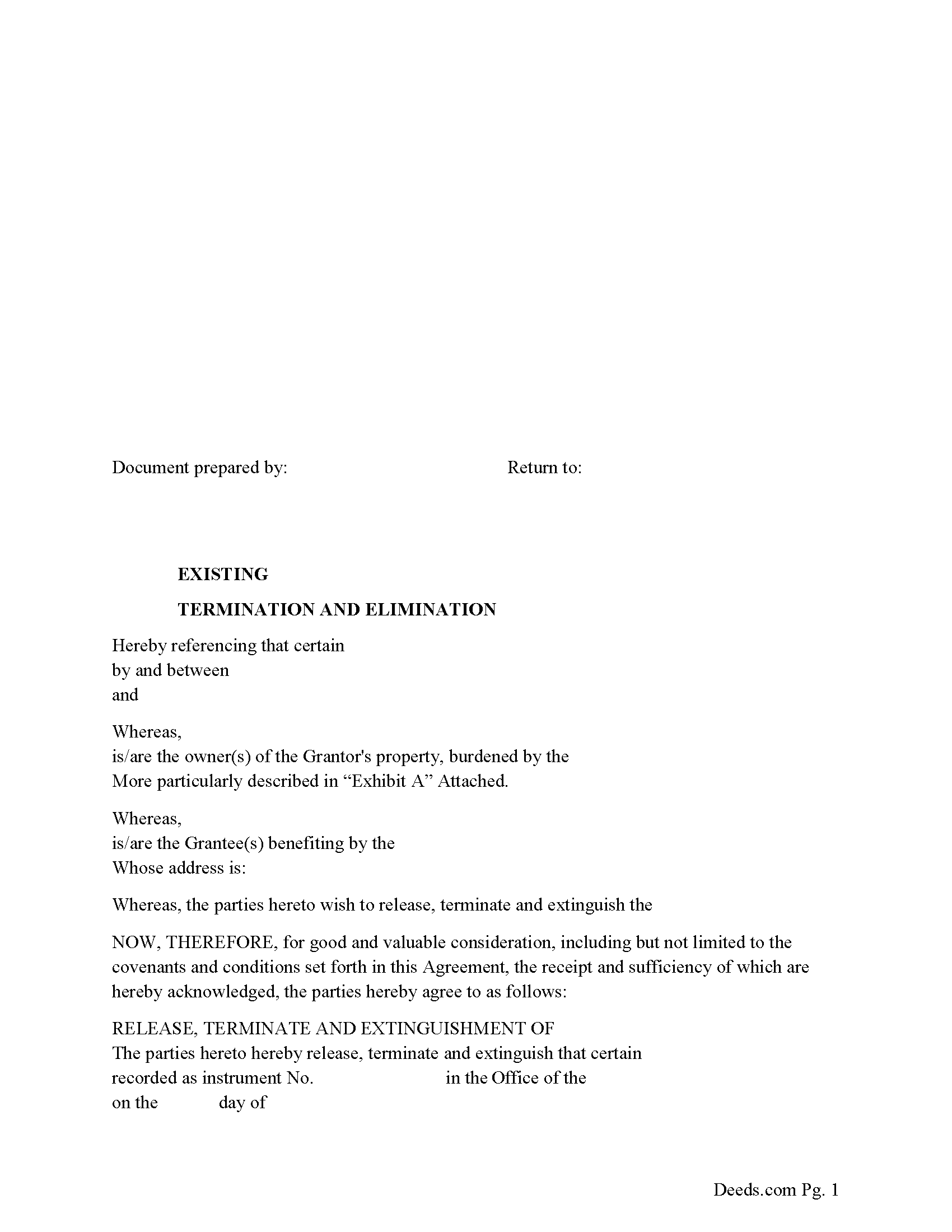
Use this form to release, terminate, extinguish a previously recorded document that involves access to and from a property.
Documents such as:
1. Easement Deeds or Agreements (An easement is a non-possessory interest in land, granting the right to use someone else's property for a specific purpose, like a driveway or utility line)
2. Access Roads
3. Right of Ways
4. Utility Easements (Power, Gas, Water, Sewer, Etc.)
5. Drainage Easements
This document allows the owner of the land, burdened by the access and the party that benefits from the access, to sign an agreement releasing the property from such access, ... More Information about the Nebraska Termination of Easement
Transfer on Death Deed
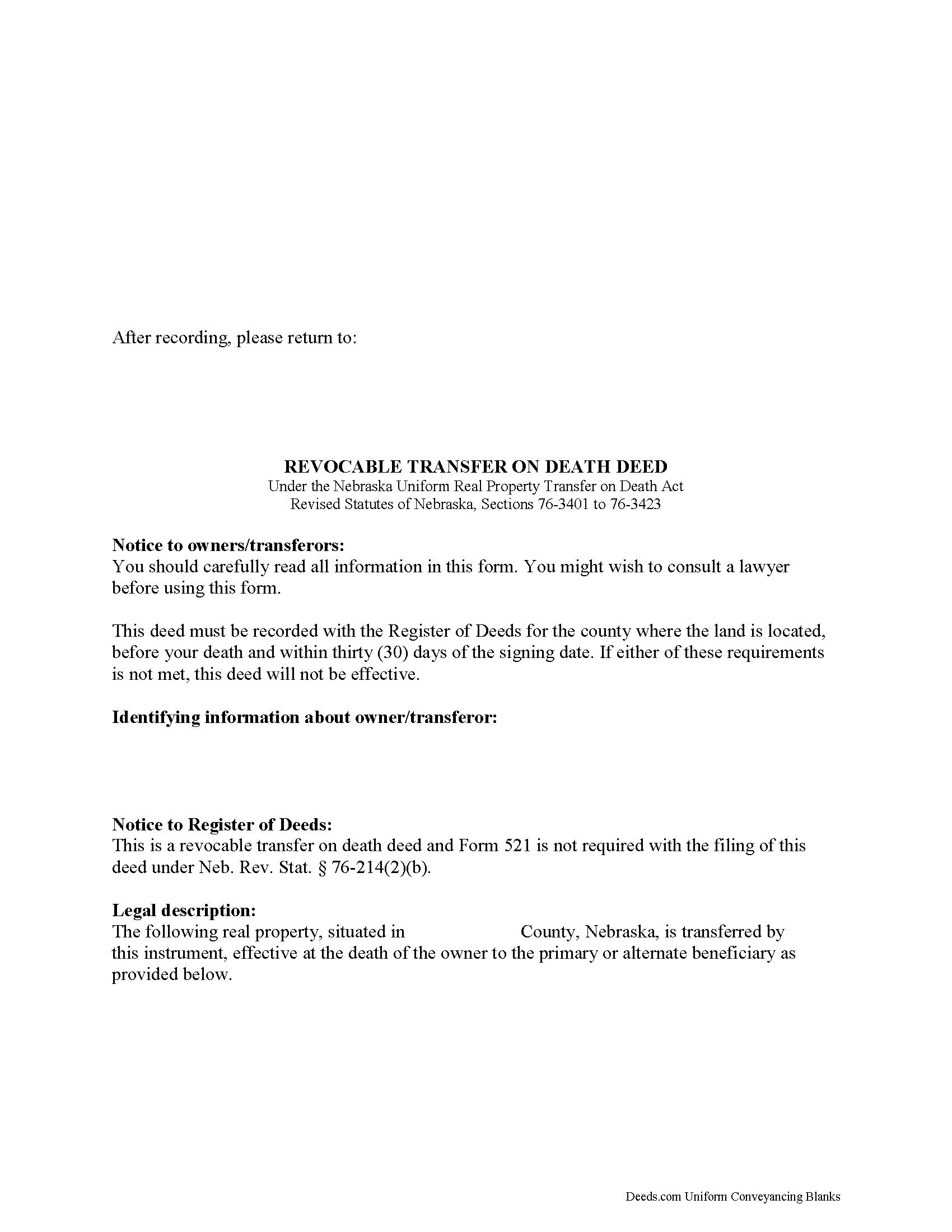
The Nebraska Uniform Real Property Transfer on Death Act is found at Sections 76-3401 to 76-3423 of the Nebraska Revised Statutes. This useful law provides an option for land owners to convey their real estate after their death, but without the need to include it in a will.
A transfer on death deed (TODD), when lawfully executed, allows property owners to retain absolute title to and control over their land during their lives ( 76-3414). The deeds are also revocable (76-3413). In part, these features are possible because unlike traditional deeds (warranty deeds, quitclaim deeds, etc.), TODDs do not require consideration from or notice to the beneficiary ( 76-3411).
In addition to meeting the content requirements of traditional deeds, people who use or revoke TODDs must meet the same competency standards as for creating a will (76-3408). The statute also demands the signatures of two disinterested witnesses (76-3409). Further, the document must contain specific warnings and must be recorded before the owner's death and within thirty days of signing ( 76-3410).
The rules for revoking a recorded TODD are set out at 76-3413. They include executing and recording a document... More Information about the Nebraska Transfer on Death Deed
Transfer on Death Revocation
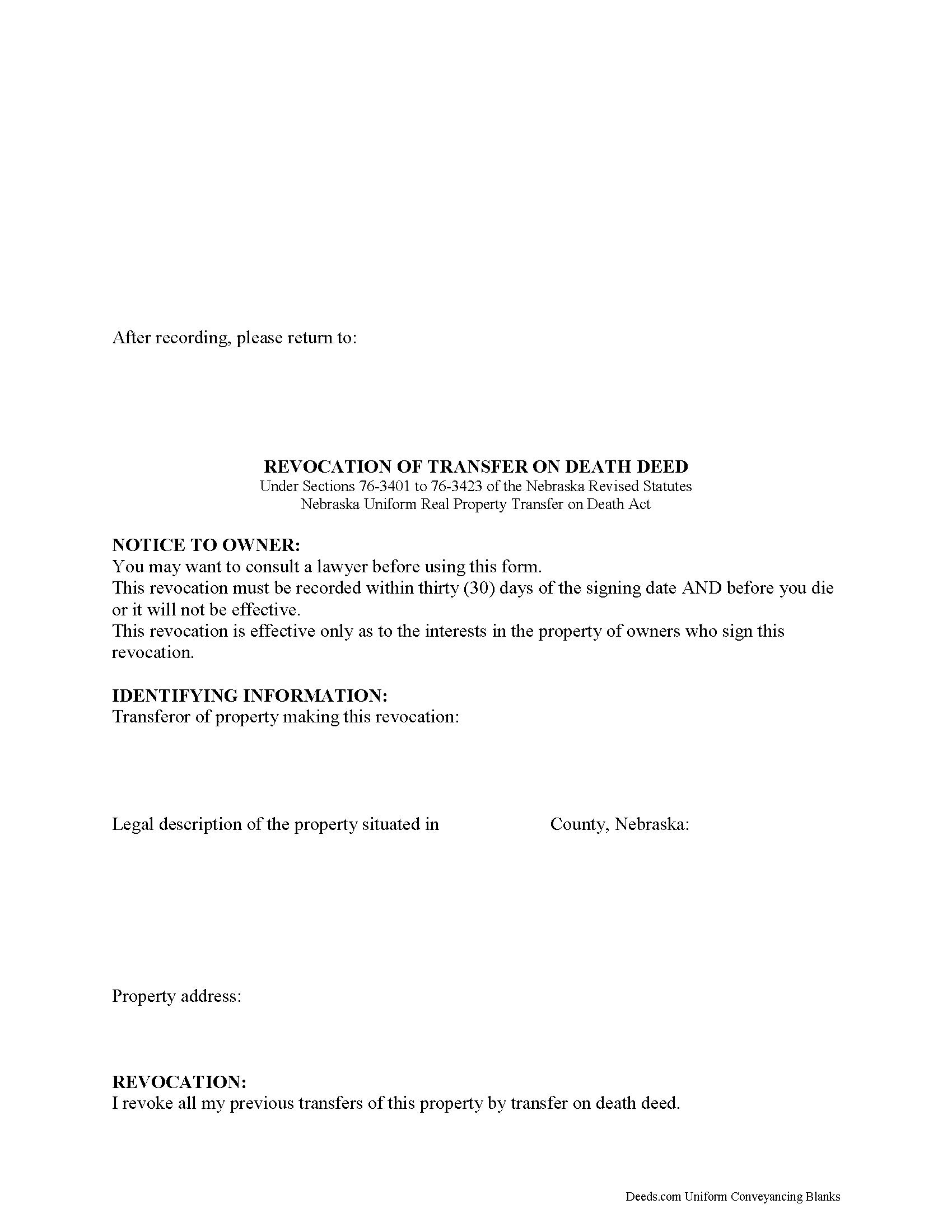
Revoking a Nebraska Transfer on Death Deed
The Nebraska Uniform Real Property Transfer on Death Act is found at Sections 76-3401 to 76-3423 of the Nebraska Revised Statutes. This useful law provides an option for land owners to convey their real estate after their death, but without the need to include it in a will.
A transfer on death deed (TODD), when lawfully executed, allows property owners to retain absolute title to and control over their land during their lives ( 76-3414). The deeds are also revocable (76-3413). In part, these features are possible because unlike traditional deeds (warranty deeds, quitclaim deeds, etc.), TODDs do not require consideration from or notice to the beneficiary ( 76-3411).
Revocability is a valuable feature of transfer on death deeds. With it, land owners can quickly and easily respond to changes in their lives or the lives of their beneficiaries, and redirect any future transfer toward a more appropriate outcome.
The options for revoking a recorded TODD are set out at 76-3413. They include executing and recording one or more of the following: a document that specifically revokes the TODD ( 76-3413(1)(B)); a new TODD that revokes ... More Information about the Nebraska Transfer on Death Revocation
Affidavit of Death
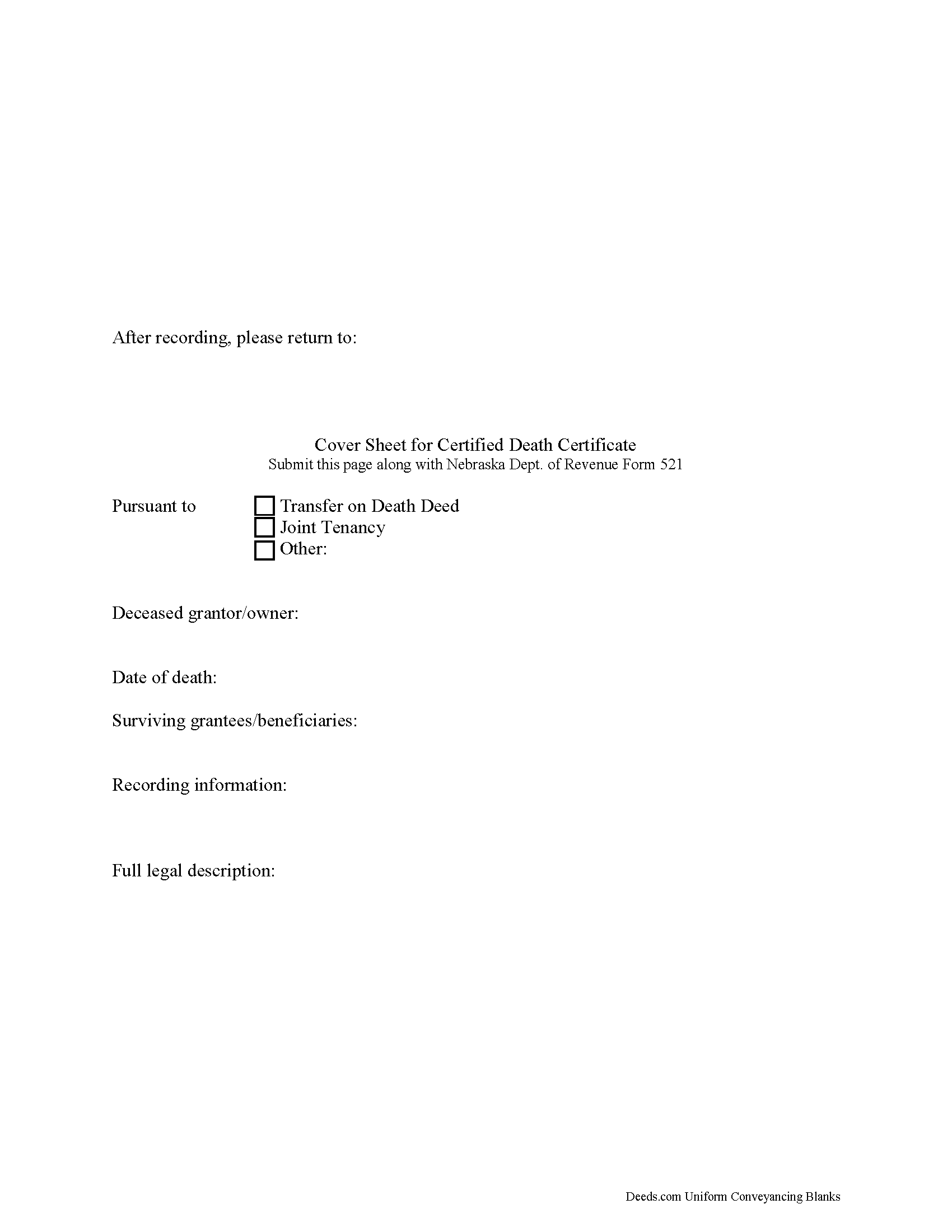
Confirming a Transfer of Nebraska Real Estate after Death of principle.
Under Nebraska Revised Statutes section 76-214, deeds and other instruments transferring title submitted for recording must be accompanied by a statement containing details about the transfer. Form 521, found on the websites for most counties or at http://www.revenue.nebraska.gov/PAD/forms/521_Real_Estate_Transfer_Statement.pdf meets most of these requirements.
Transfers resulting from a property owner's death, such as those under transfer on death deeds or joint tenancies, may require additional information (76-214(1), (2)). In those situations, including a cover sheet that contains the extra details assists the recording office and reduces the chance of delays in processing.
Each case is unique, so please contact an attorney with specific questions or for complex situations.
(Nebraska AOD Package includes form, guidelines, and completed example)... More Information about the Nebraska Affidavit of Death
Trustee Deed for Inter Vivos Trust
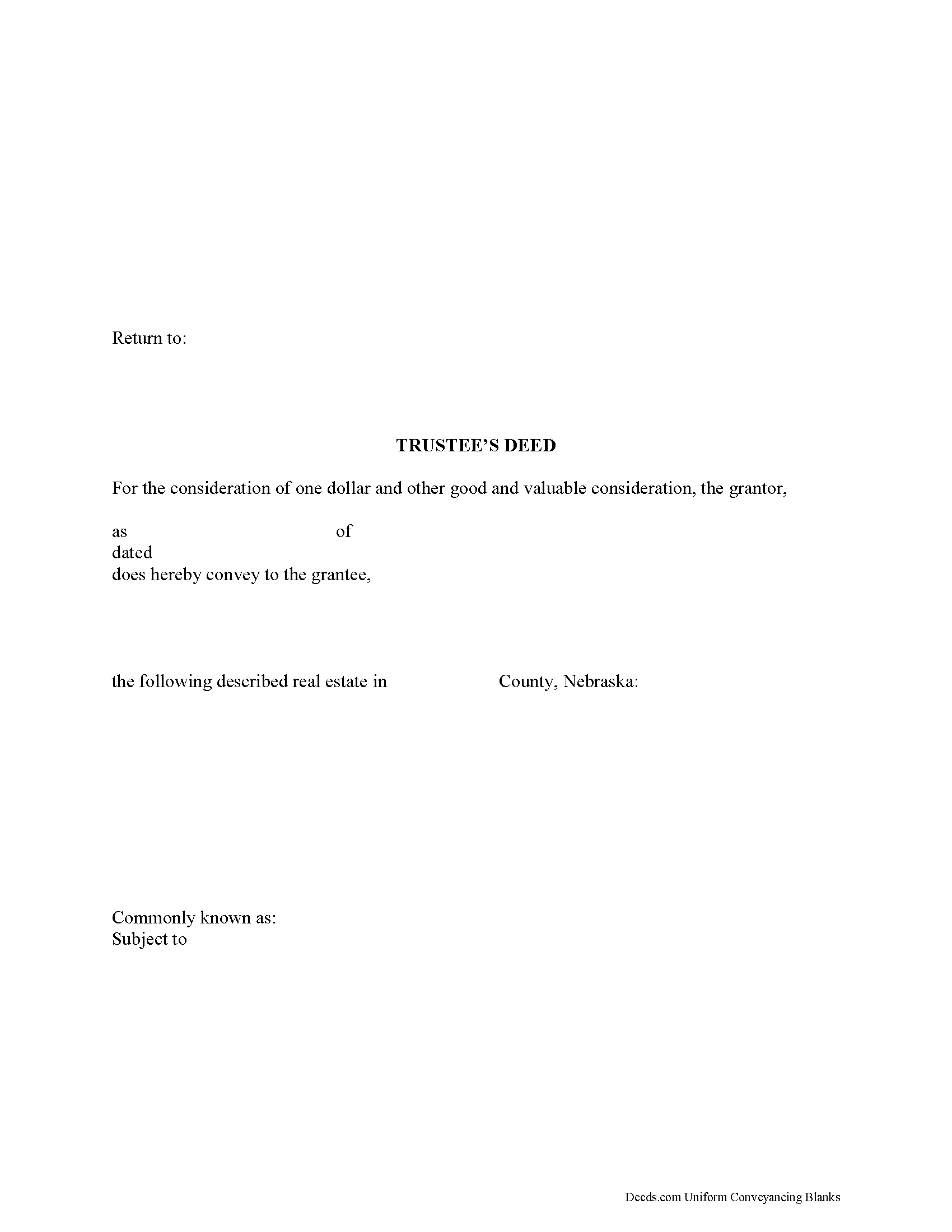
A trust is an arrangement created when one person (the settlor) conveys property to a second person (the trustee) for the benefit of a third (the beneficiary). The settlor executes a trust instrument to establish the terms of the trust, and funds the trust with assets. In Nebraska, express trusts, or trusts "created with the settlor's express intent, usually declared in writing," according to Black's Law Dictionary, 8th ed., are governed by the Uniform Trust Code, codified at Neb. Rev. Stat. Ann. 30-3801.
A non-testamentary trust, more commonly referred to as a living trust or an inter vivos trust, is used for estate planning purposes; it allows a settlor to plan for his assets, including real property interests, in the event of death. A settlor may appoint himself as the trustee and designate a successor trustee (the settlor may not be the sole beneficiary, however).
Specific powers confirmed upon the trustee under 30-3881 include the power to sell trust property. In Nebraska, the trustee's deed is used to convey real property from a living trust. As the administrator of the trust and because the trustee holds legal title to the property, it is the trustee's job to execu... More Information about the Nebraska Trustee Deed for Inter Vivos Trust
Personal Representative Deed of Sale
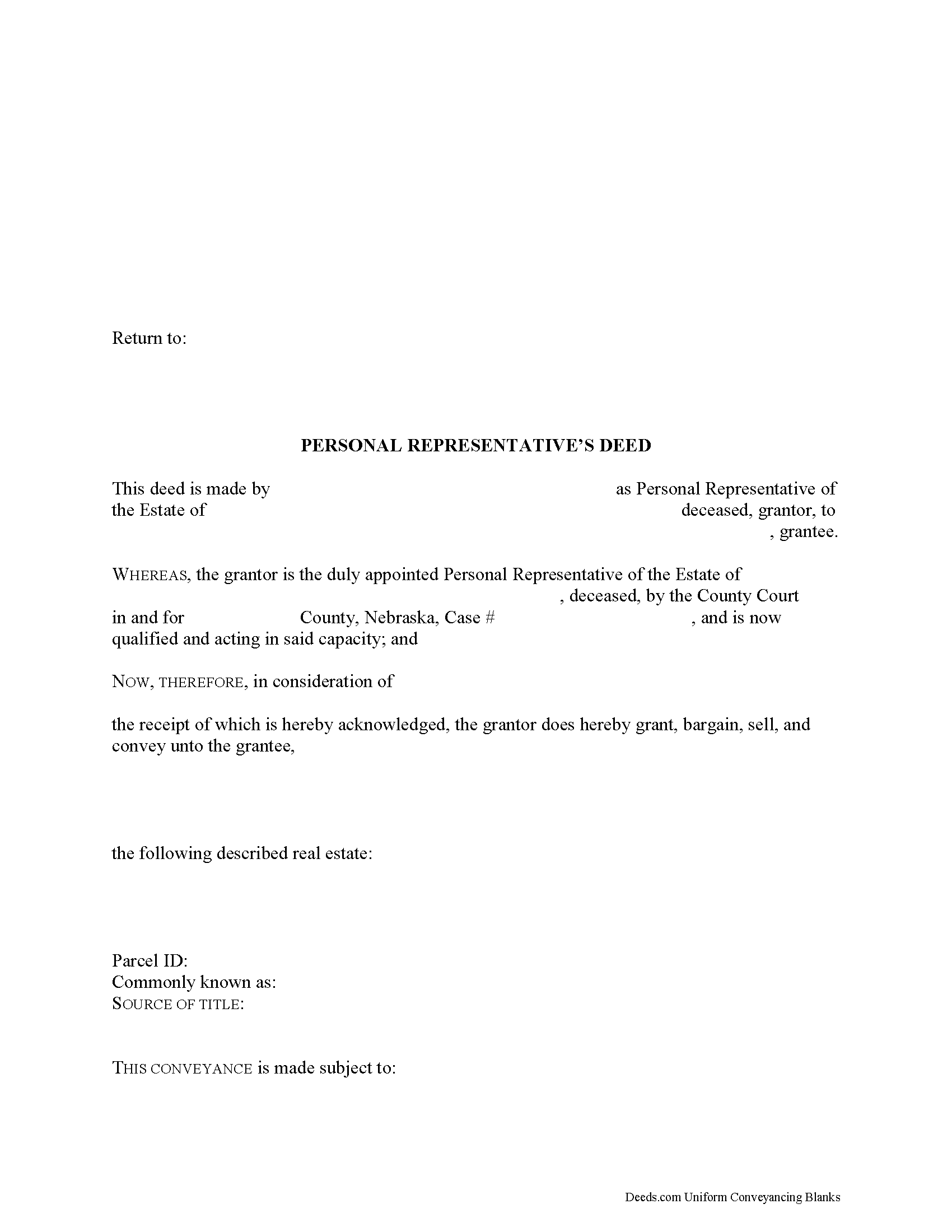
Nebraska Personal Representative's Deed (Sale)
A personal representative's deed is a fiduciary instrument used to convey real property from an estate to a purchaser. The deed is named for the capacity of the executing party. A personal representative is the fiduciary appointed by the County Court to administer a decedent's estate in probate.
Use a personal representative's deed when a decedent's will include provisions for the sale of real property, pursuant to an order for sale under formal probate proceedings, or when administration of the estate necessitates. PR deeds typically recite the decedent's name and the case number assigned to the estate by the court, and expressly state that the grantor is executing the deed in a representative capacity. They must meet all requirements of form and content for documents pertaining to interest in real property in the State of Nebraska, including a complete legal description of the subject parcel. A Real Estate Transfer Form is required, along with the documentary stamp tax. Record the deed in the Register of Deeds office in the county where the real property is situated.
Consult an attorney with questions regarding personal repr... More Information about the Nebraska Personal Representative Deed of Sale
Personal Representative Deed of Distribution
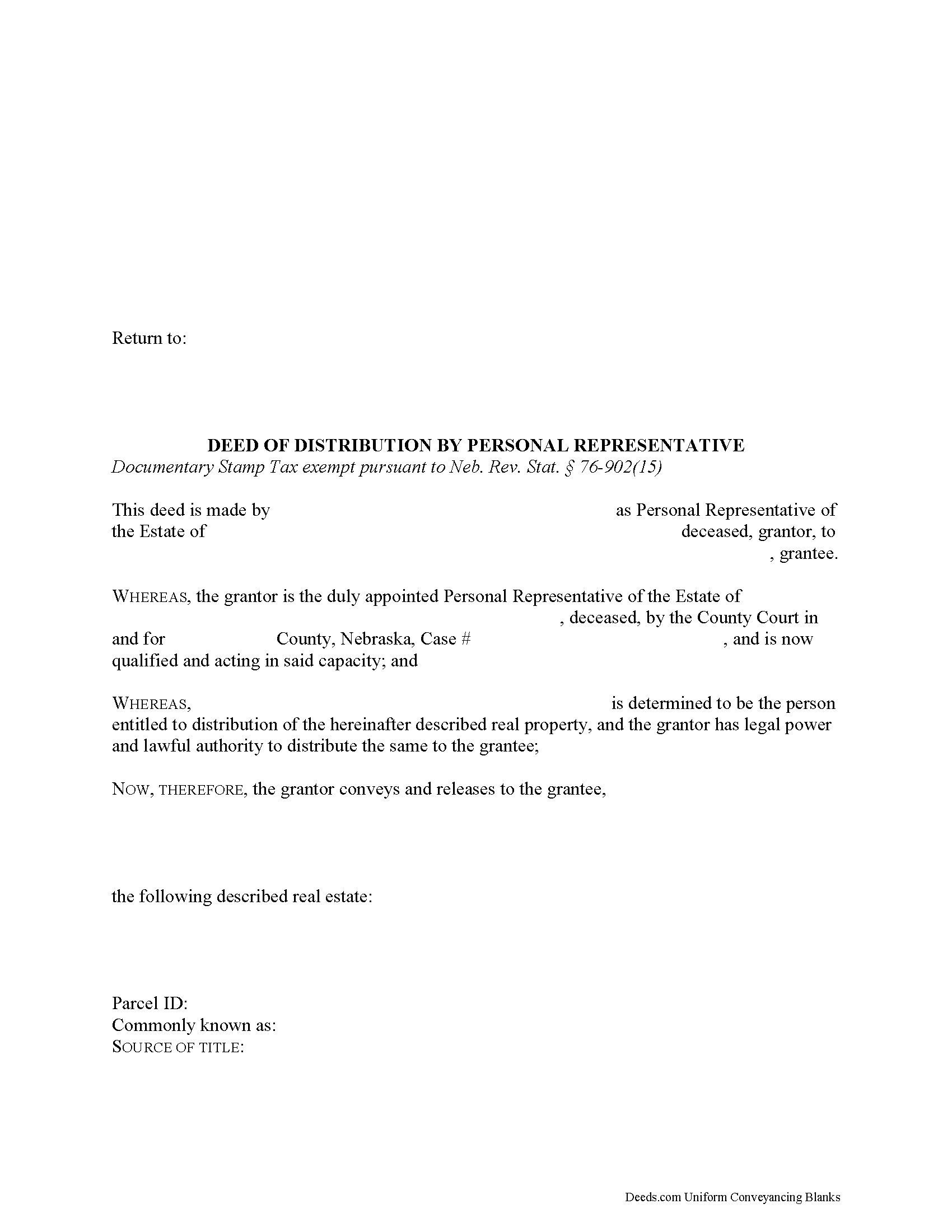
A personal representative is the fiduciary appointed by the County Court to administer a decedent's estate in probate. The deed transfers title to a decedent's real property to the distributee as grantee. The distributee may be a devisee under the decedent's will, or an heir with a right to succeeding interest under Nebraska's laws of intestate succession when there is no testamentary disposition.
Record a deed of distribution in the Register of Deeds office of the county where the subject property is located as proof of the distributee's succession to the decedent's interest in real property (Neb. Rev. Stat. 30-24,106). PR deeds typically recite the decedent's name and the case number assigned to the estate by the court, and expressly state that the grantor is executing the deed in a representative capacity. They must meet all requirements of form and content for documents pertaining to interest in real property in the State of Nebraska, including a complete legal description of the subject parcel. A Real Estate Transfer Form is required, but the conveyance is exempt from documentary stamp tax.
As always, consult an attorney with questions regarding personal representative'... More Information about the Nebraska Personal Representative Deed of Distribution
Affidavit for Transfer of Real Property without Probate
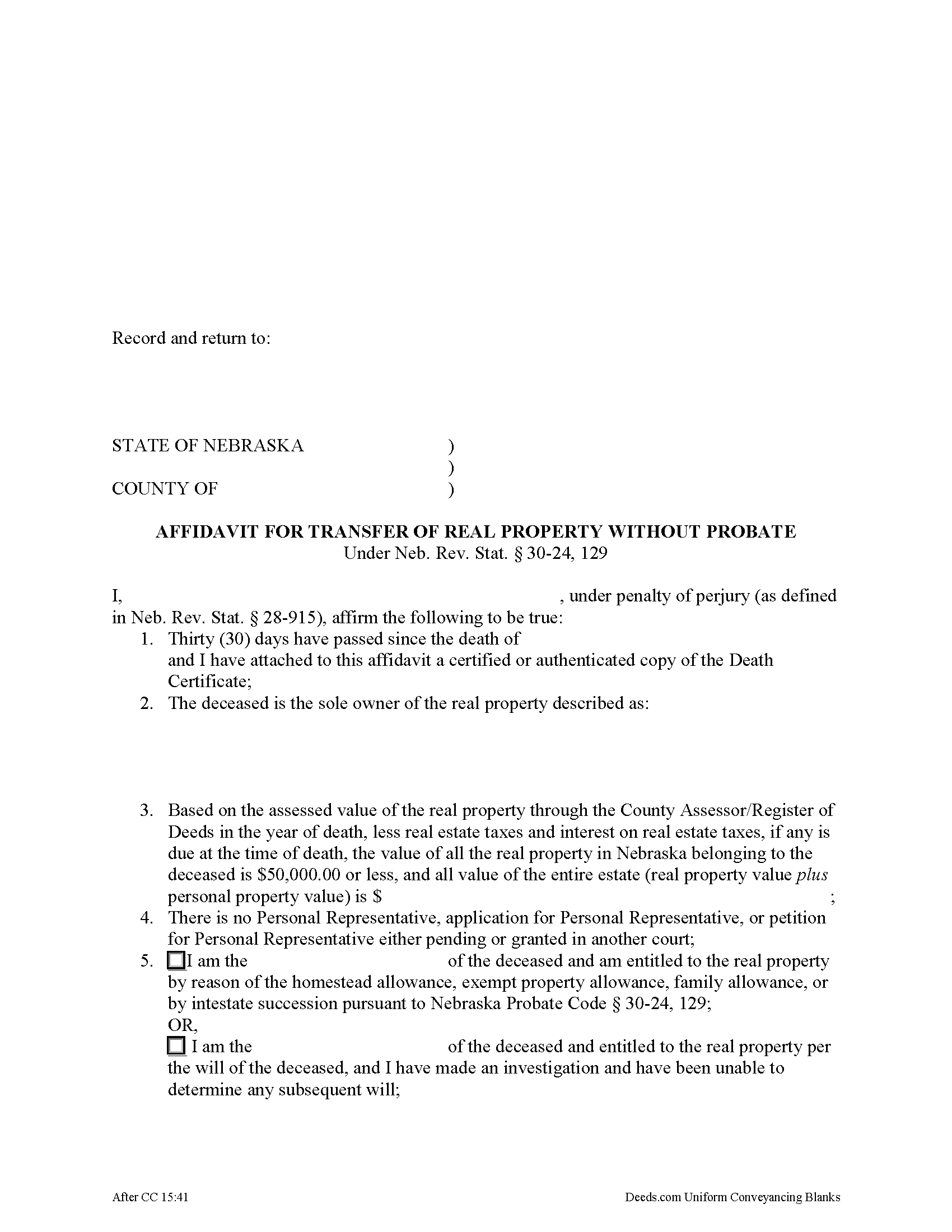
Record the affidavit under the Nebraska Probate 30-24,129 to transfer a decedent's real property without probate when certain criteria are met. The affidavit must be recorded in each county in which the real property described within the affidavit is located, along with a certified copy of the decedent's death certificate.
The affiant, or person executing the affidavit, is the successor in interest to the decedent's real property described in the affidavit, or an agent legally acting on the successor's behalf.
Statutory requirements stipulate that the affidavit state that total value of the decedent's real estate interests is $50,000.00 or less; thirty (30) days have passed since the decedent's death, as evidenced by a certified copy of the death certificate; there is no personal representative or pending petition for appointment of a personal representative; the successor is entitled to receive the property through a homestead, exempt property, or family allowance, or by devise or intestate succession; the successor has made an investigation and was unable to determine a subsequent will; and no other person has a right to the interest of the subject property. In addition, ... More Information about the Nebraska Affidavit for Transfer of Real Property without Probate
Notice of Right to Assert a Lien
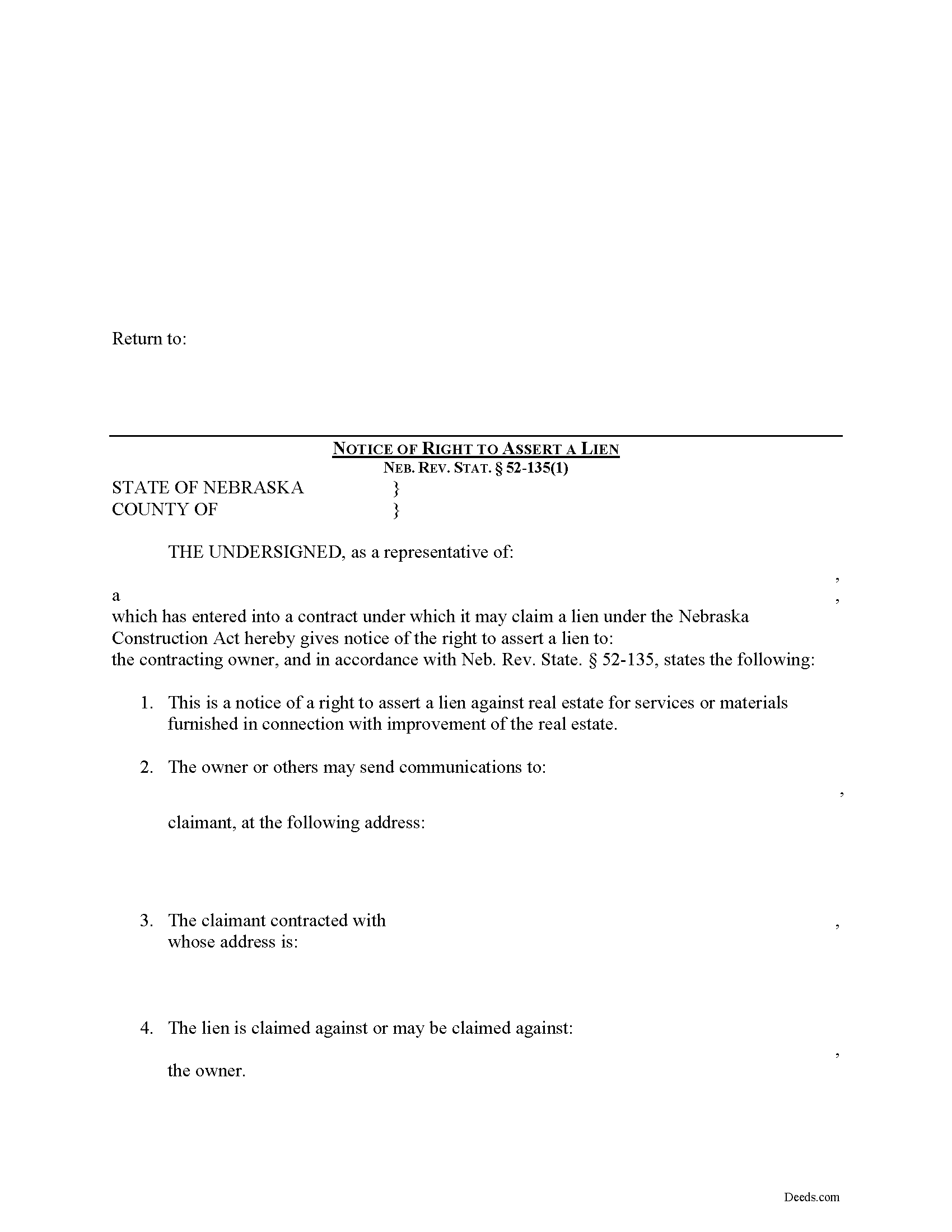
Construction liens are governed under the Nebraska Construction Lien Act, found at Sections 52-125 to 52-159 of the Nebraska Revised Statutes.
In order to file for a construction lien, the claimant must correctly follow the steps set out by state law. In Nebraska, the first step is to serve the owner or person who contracted with the owner with a Notice of Right to Assert Lien. At any time after a claimant has entered into the contract under which he or she may claim a lien under the Nebraska Construction Lien Act, he or she may give notice of the right to assert a lien to the contracting owner. Neb. Rev. Stat. 52-135(1). The Notice lets the owner know that someone is providing material, labor, or machinery on their land and that person may have a right to file a lien.
The notice of the right to assert a lien must be in writing, state that it is a notice of a right to assert a lien against real estate for services or materials furnished in connection with improvement of the real estate, and contain: (a) The name of the claimant and the address to which the owner or others may send communications to the claimant; (b) The name and address of the person with whom the claimant co... More Information about the Nebraska Notice of Right to Assert a Lien
Owner Notice of Commencement
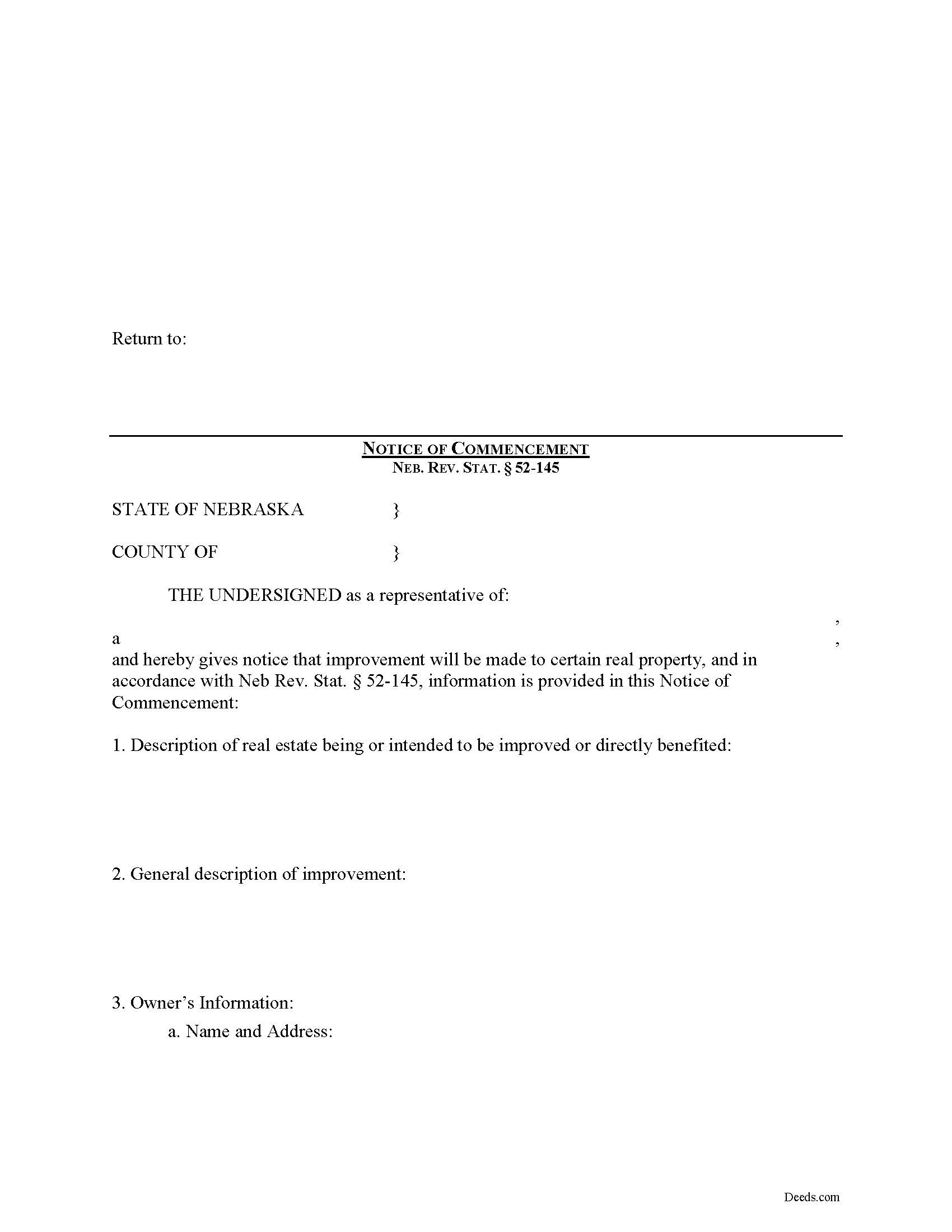
Construction liens are governed under the Nebraska Construction Lien Act, found at Sections 52-125 to 52-159 of the Nebraska Revised Statutes.
A notice of commencement is used by a property owner to put all other parties on notice than an improvement will be made to the owner's real property. Another (more important) purpose of the notice is to start the time within which construction liens can be claimed.
A notice of commencement must be signed by the contracting owner, be identified as a notice of commencement, and state: (a) The real estate being or intended to be improved or directly benefited, with a description thereof sufficient for identification; (b) The name and address of the contracting owner, his or her interest in the real estate, and the name and address of the fee simple title holder, if other than the contracting owner; and (c) That if, after the notice of commencement is recorded, a lien is recorded as to an improvement covered by the notice of commencement, the lien has priority from the time the notice of commencement is recorded. Neb. Rev. Stat. 52-145(1).
The notice of commencement may also define its duration, with a minimum limit of six months from ... More Information about the Nebraska Owner Notice of Commencement
Contractor Notice of Commencement
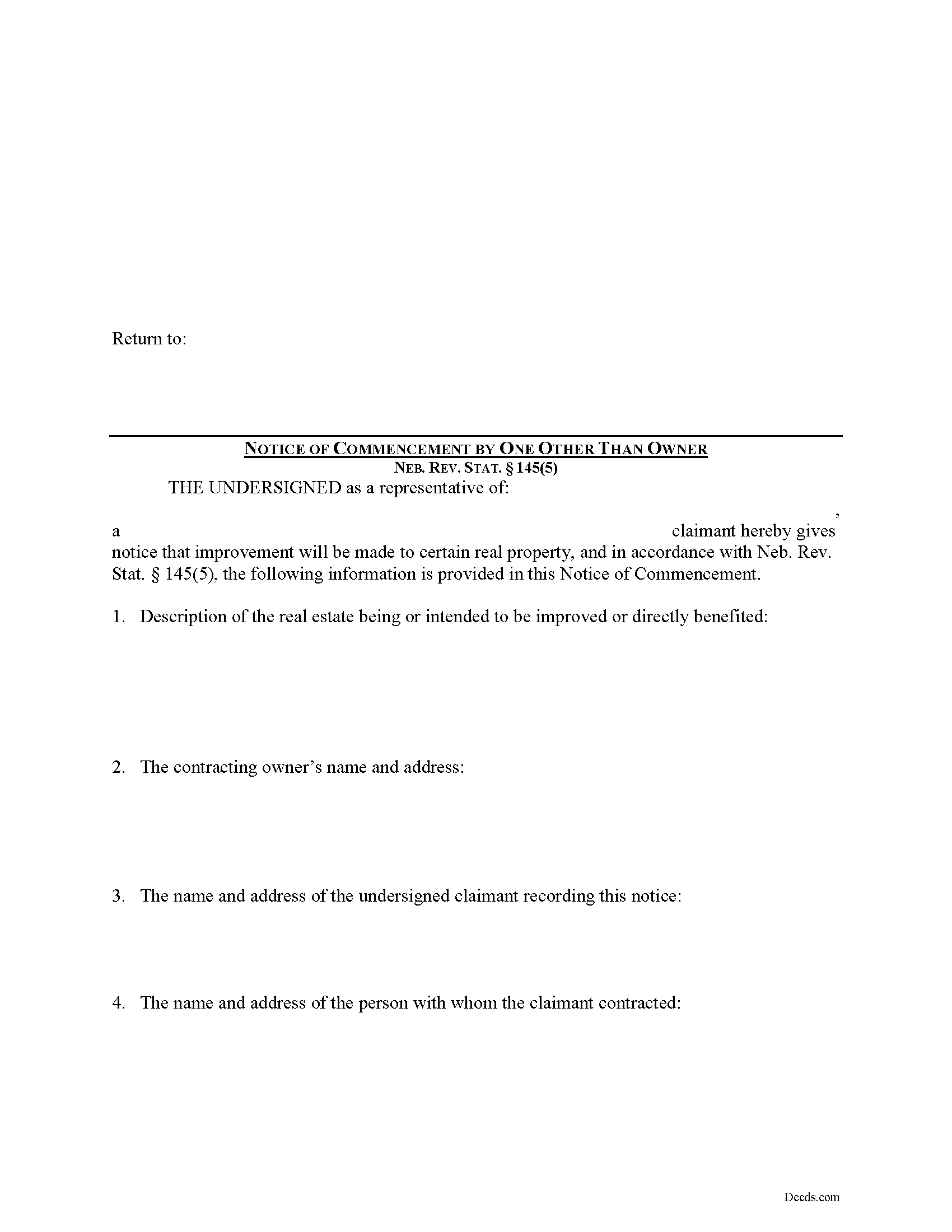
Notice of Commencement by a Party Other than an Owner
Construction liens are governed under the Nebraska Construction Lien Act, found at Sections 52-125 to 52-159 of the Nebraska Revised Statutes.
In most cases, the owner of the property being improved files a notice of commencement with the recording office for the county where the land is situated. Under Nebraska law, the notice of commencement required at the outset of a construction project can also be recorded by someone other than the property owner, such as a contractor or subcontractor.
If no notice of commencement is on record for an improvement, any claimant who is entitled to record a lien may record a notice of commencement clearly identified as such, stating:
(a) The real estate being or intended to be improved or directly benefited, with a description thereof sufficient for identification;
(b) The name and address of the contracting owner against whom the notice of commencement is effective;
(c) The name and address of the claimant recording the notice of commencement;
(d) The name and address of the person with whom the claimant contracted with respect to the improvement;
(e) A brief description of... More Information about the Nebraska Contractor Notice of Commencement
Notice of Termination
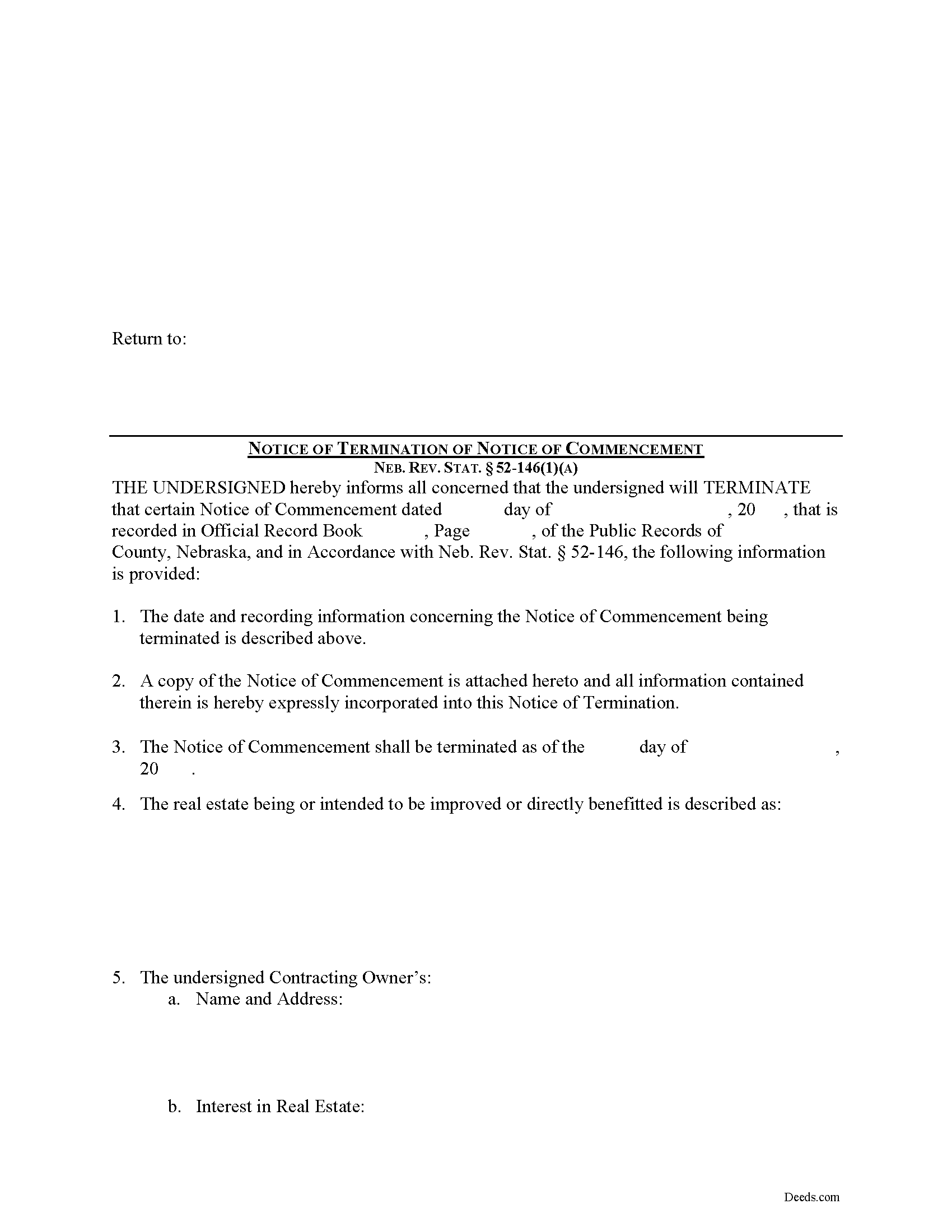
Construction liens are governed under the Nebraska Construction Lien Act, found at Sections 52-125 to 52-159 of the Nebraska Revised Statutes.
In Nebraska, a contracting owner may terminate a notice of commencement as to all or any identified portion of the real estate subject to the notice of commencement by recording a notice of termination. Neb. Rev. Stat. 52-146(1).
The notice of termination must contain the following:
1) The information required for a notice of commencement (See Neb. Rev. Stat. 52-145);
2) A reference to the recorded notice of commencement by its record location and a statement of its date of recording;
3) A statement of the date as of which the notice of commencement is terminated which date may not be earlier than thirty (30) days after the notice of termination is recorded; and
4) If the notice of termination is to apply only to a portion of the real estate subject to the notice of commencement, a statement of that fact and a description of the portion of the real estate to which the notice of termination applies. Id.
Note that, in addition to the content requirements, the form must meet all state and local standards for recorded documents.... More Information about the Nebraska Notice of Termination
Published Notice of Termination
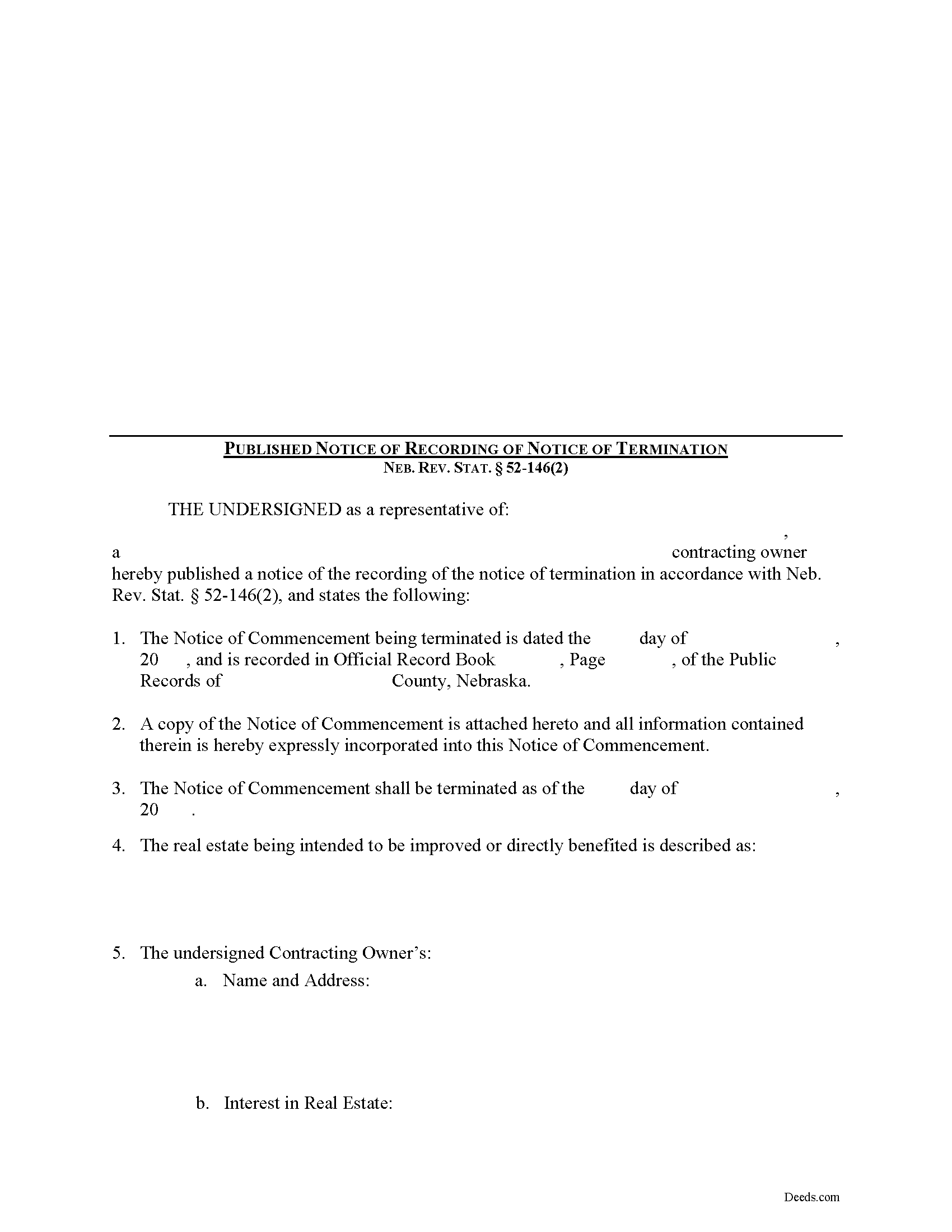
Construction liens are governed under the Nebraska Construction Lien Act, found at Sections 52-125 to 52-159 of the Nebraska Revised Statutes.
In Nebraska, a contracting owner may terminate a notice of commencement as to all or any identified portion of the real estate subject to the notice of commencement by recording a notice of termination, then publishing a notice of the recording of the notice of termination. Neb. Rev. Stat. 52-156(1)(c).
The notice must be published at least once a week for three consecutive weeks in a newspaper having general circulation in the county where the recording occurs, the last publication of which must be at least five days before the stated termination date. Id.
The published notice of the recording of the notice of termination must contain the same information required for the notice of termination, a statement of the date on which the notice of termination was recorded, and a statement that all lien claims for which a notice of lien is not recorded by the termination date may be defeated by a transfer of the real estate. Neb. Rev. Stat. 52-156(2).
This article is offered for informational purposes only and is not legal advice. This ... More Information about the Nebraska Published Notice of Termination
Notice of Termination Affidavit
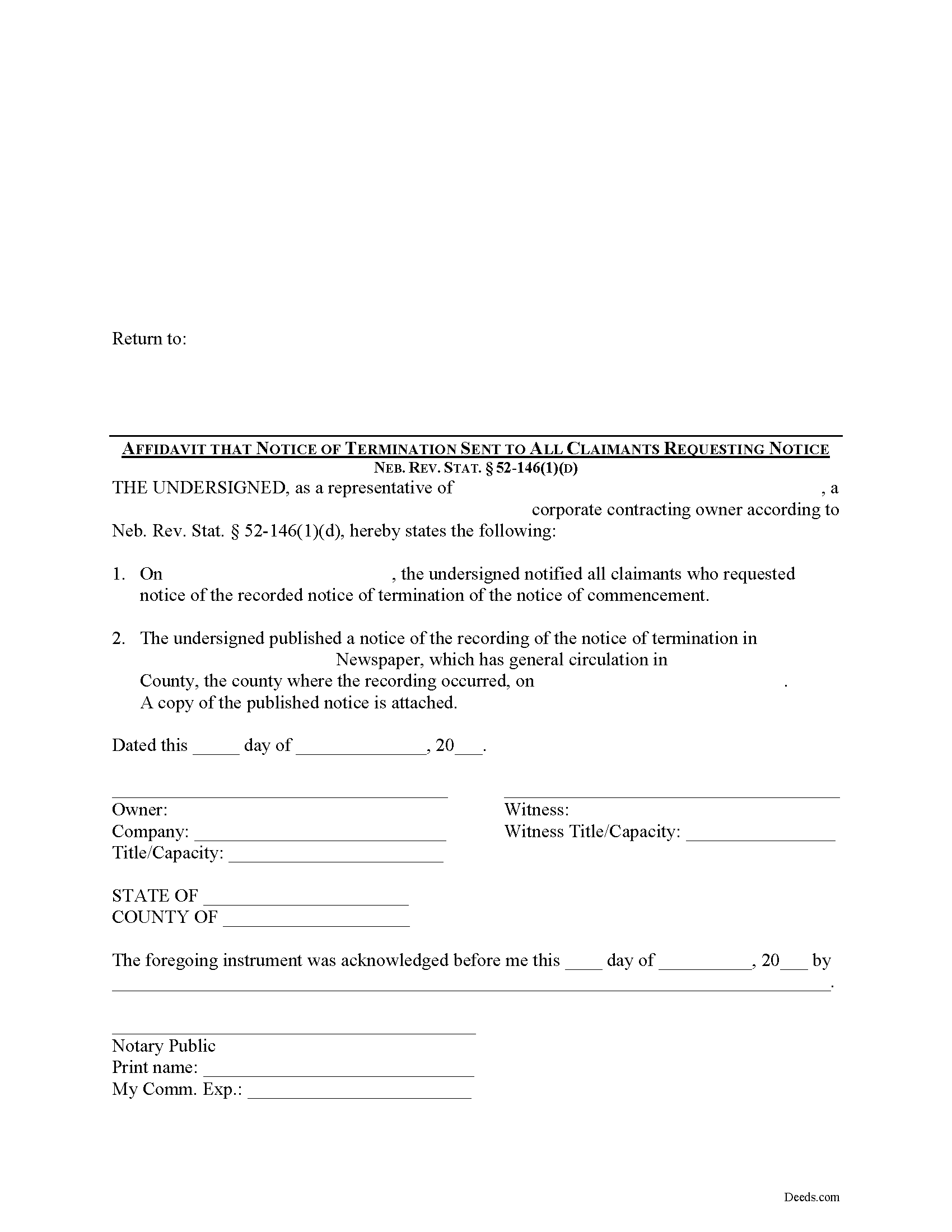
Construction liens are governed under the Nebraska Construction Lien Act, found at Sections 52-125 to 52-159 of the Nebraska Revised Statutes.
In Nebraska, a contracting owner may terminate a notice of commencement as to all or any identified portion of the real estate subject to that notice by recording a notice of termination. Neb. Rev. Stat. 52-146(1). Note that in addition to the statutory content requirements, the affidavit must meet state and local standards for recorded documents.
The owner must also complete and publish or record the following in addition to recording the notice of termination:
1) Send, at least three weeks before the effective date of the notice of termination, a copy of the notice of termination, showing the date it was recorded, to all claimants who have requested that the owner notify them of the recording of a notice of termination;
2) Publish a notice of the recording of the notice of termination, at least once a week for three consecutive weeks in a newspaper having general circulation in the county where the recording occurs, the last publication of which must be at least five days before the stated termination date; and
3) Record an aff... More Information about the Nebraska Notice of Termination Affidavit
Construction Lien
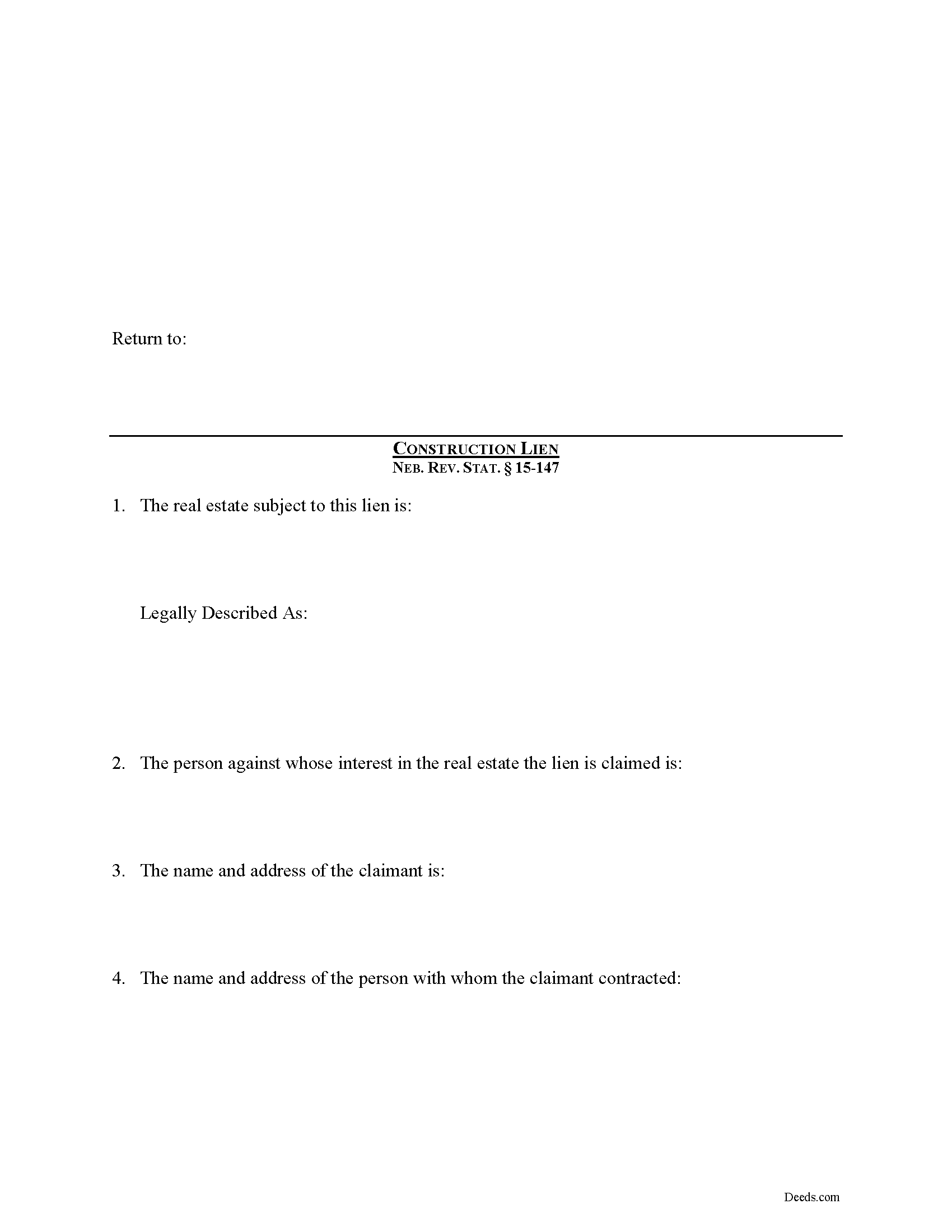
Securing a Nebraska Construction Lien
Construction liens are governed under the Nebraska Construction Lien Act, found at Sections 52-125 to 52-159 of the Nebraska Revised Statutes.
A lien is a legal right or interest in property, held by a creditor until the debtor pays the amount due on account. Construction liens are often used to persuade an owner or other party to pay a contractor the balance owed for work on real property. For instance, if a contractor who completed a project is waiting for payment, a lien might make sense. Because liens prevent an owner from selling or refinancing a property (or make it difficult to do so), they offer an effective remedy for contractors and other eligible parties.
A claimant may record a lien which shall be signed by the claimant and state: (a) The real estate subject to the lien, with a description thereof sufficient for identification; (b) The name of the person against whose interest in the real estate a lien is claimed; (c) The name and address of the claimant; (d) The name and address of the person with whom the claimant contracted; (e) A general description of the services performed or to be performed or materials furnished o... More Information about the Nebraska Construction Lien
Construction Lien Amendment
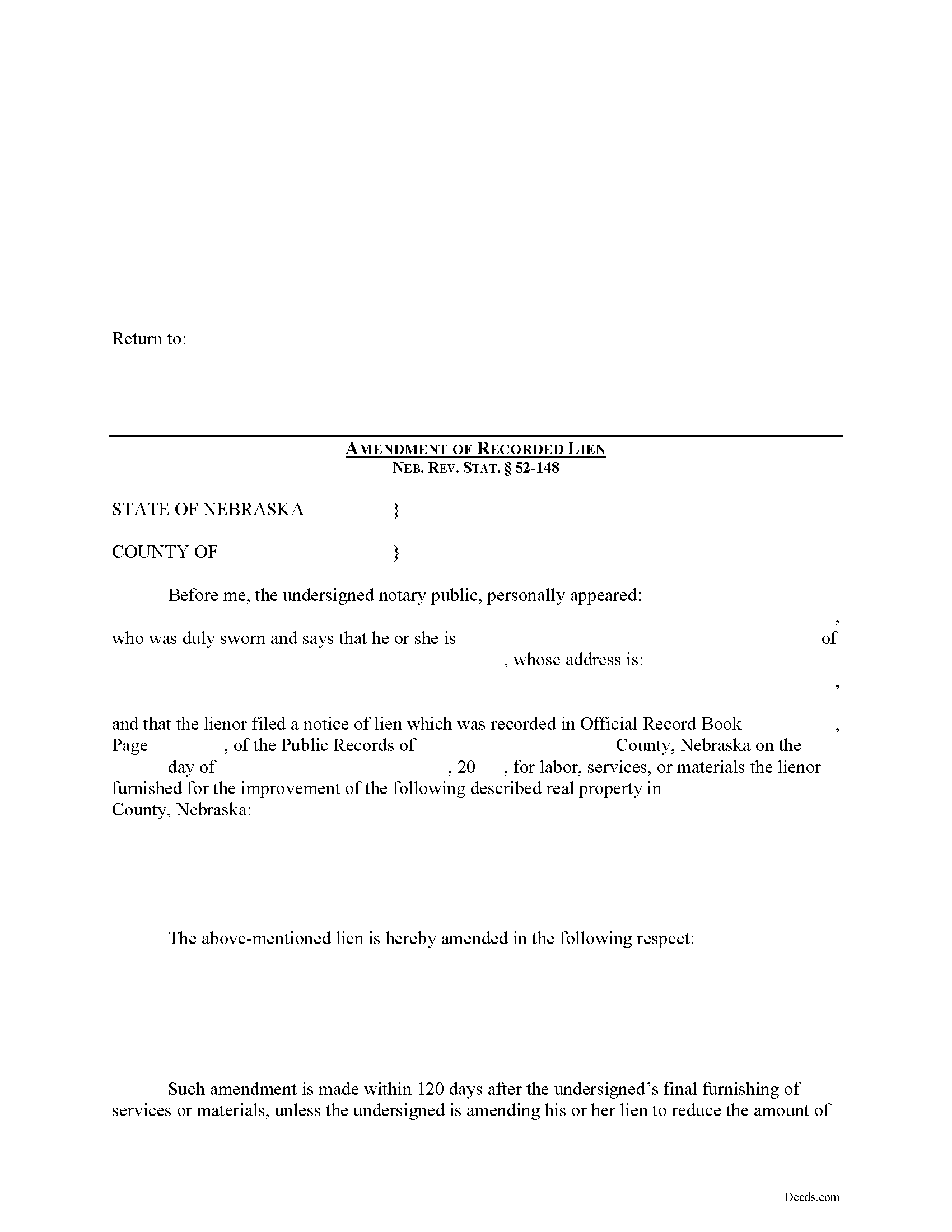
Amending a Construction Lien in Nebraska
Construction liens are governed under the Nebraska Construction Lien Act, found at Sections 52-125 to 52-159 of the Nebraska Revised Statutes.
Once a lien is recorded, there may be a reason to modify it later on. Should a modification become necessary, the claimant must file an Amendment of Recorded Lien.
A recorded lien may be amended by an additional recording at any time during the period allowed for recording the original lien. Neb. Rev. Stat. 52-148(1). An amendment adding real estate or increasing the amount of lien claimed is effective as to the additional real estate or increased amount only from the time the amendment is recorded. Id.
After the period allowed for recording the original lien, it may be amended for the purpose of: (a) Reducing the amount of the lien; (b) Reducing the real estate against which the lien is claimed; or (c) Making an apportionment of the lien among lots of a platted subdivision of record. Neb. Rev. Stat. 52-148(2).
The amendment states the recording location and date of recording of the notice of lien being amended and sets out the respects in which it is being amended. Neb. Rev. Stat. 52-1... More Information about the Nebraska Construction Lien Amendment
Construction Lien Assignment
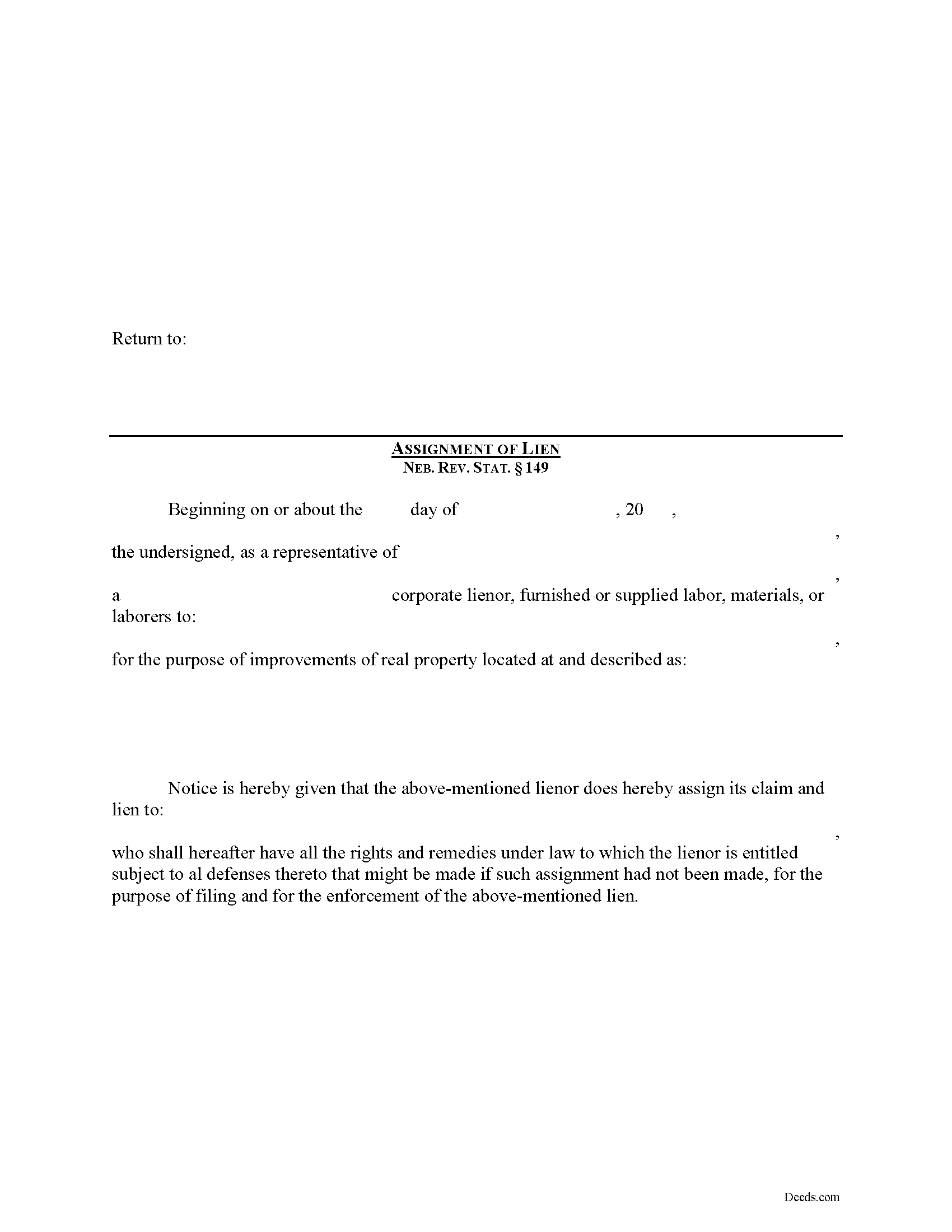
Assigning a Construction Lien in Nebraska
Construction liens are governed under the Nebraska Construction Lien Act, found at Sections 52-125 to 52-159 of the Nebraska Revised Statutes.
Once a lien is in place, the claimant can transfer the right to collect on that lien to someone else. This is known as "assignment." One of the fundamental principles of contract law is the right to assign contract rights to a third party. For example, Tom contracts with Jerry to build Jerry a house. Tom then assigns the right to payment for the house to Fred (maybe he owes Fred some money on a debt). With the basic legal terminology clarified, let's move on to how lien assignments work in Nebraska.
A claimant having a recorded lien, or his or her assignee, may record an assignment signed by the claimant which sets forth: (1) the name of the claimant, (2) the name and address of the assignee, (3) the person against whom the lien is claimed, (4) the real estate affected with a description thereof sufficient for identification, and (5) the record location and date of the recording of the notice of lien. Neb. Rev. Stat. 52-149(1).
The claimant files the completed assignment in the recording ... More Information about the Nebraska Construction Lien Assignment
Construction Lien Release
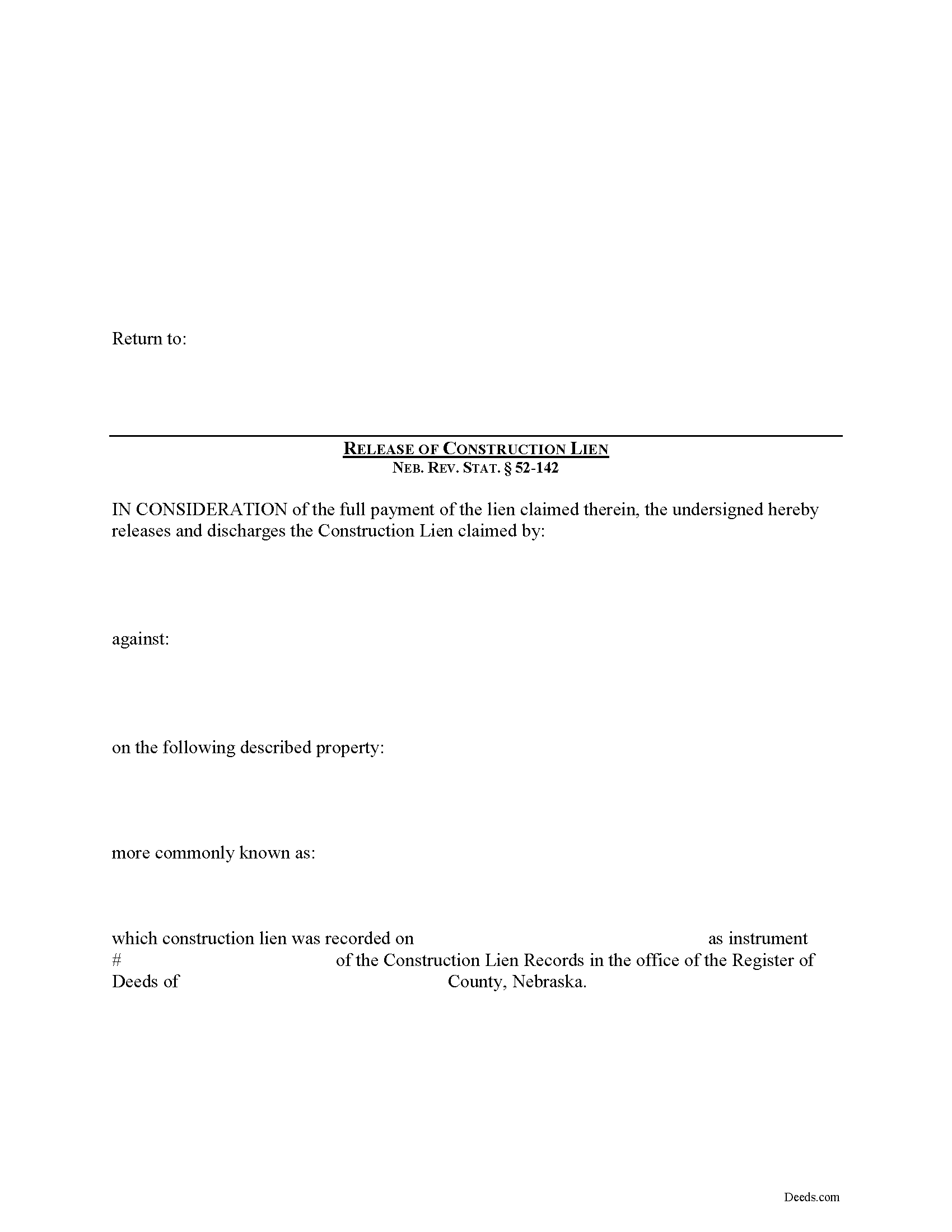
Releasing a Construction Lien in Nebraska
Construction liens are governed under the Nebraska Construction Lien Act, found at Sections 52-125 to 52-159 of the Nebraska Revised Statutes.
After a recorded lien has been paid off, it must be released by someone with an interest in the subject property. Neb. Rev. Stat. 52-142(1).
Any person having an interest in real estate may release the real estate from liens which have attached to it by: (a) Depositing in the office of the clerk of the district court of the county in which the lien is recorded a sum of money in cash, certified check, or other bank obligation, or a surety bond issued by a surety company authorized to do business in this state, in an amount sufficient to pay the total of the amounts claimed in the liens being released plus fifteen percent of such total; and (b) Recording a certificate of the clerk of the district court showing that the deposit has been made. 52-142(1)(a)-(c).
The clerk of the district court has an obligation to accept the deposit and issue the certificate. Neb. Rev. Stat. 52-142(2). Upon release of the real estate from a lien, the claimant's rights are transferred from the real estate to t... More Information about the Nebraska Construction Lien Release
Partial Conditional Lien Waiver
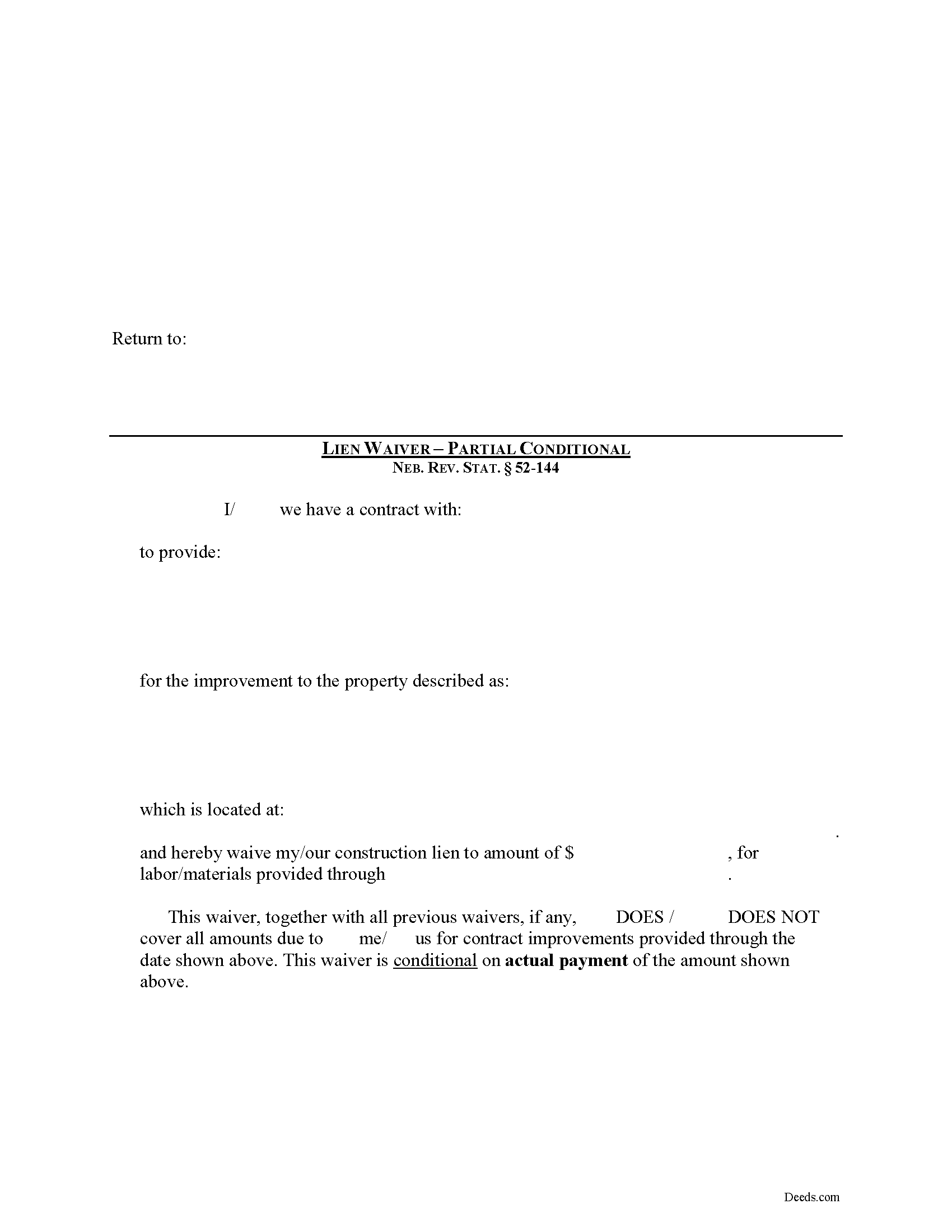
Nebraska Partial Conditional Construction Waiver
Construction liens are governed under the Nebraska Construction Lien Act, found at Sections 52-125 to 52-159 of the Nebraska Revised Statutes.
The term "waiver" means a voluntary surrender of a legal right. In this case, the person granting the waiver gives up the right to seek a construction lien for all or part of the amount due on an improvement to real property. This assurance is often enough to encourage the other party to pay the outstanding debt.
As set forth by Neb. Rev. Stat. 52-144(2), a written waiver relinquishes all construction lien rights of the claimant as to the improvement to which the waiver relates unless the waiver is specifically limited to a particular lien right or a particular portion of the services or materials furnished. A waiver of lien rights does not affect any contract rights of the claimant otherwise existing. 52-144(3). Acceptance of a promissory note or other evidence of debt is not a waiver of lien rights unless the note or other instrument expressly so declares. 52-144(4).
Expanding on the statute above, Nebraska law generally recognizes four types of lien waivers. These include parti... More Information about the Nebraska Partial Conditional Lien Waiver
Partial Unconditional Lien Waiver
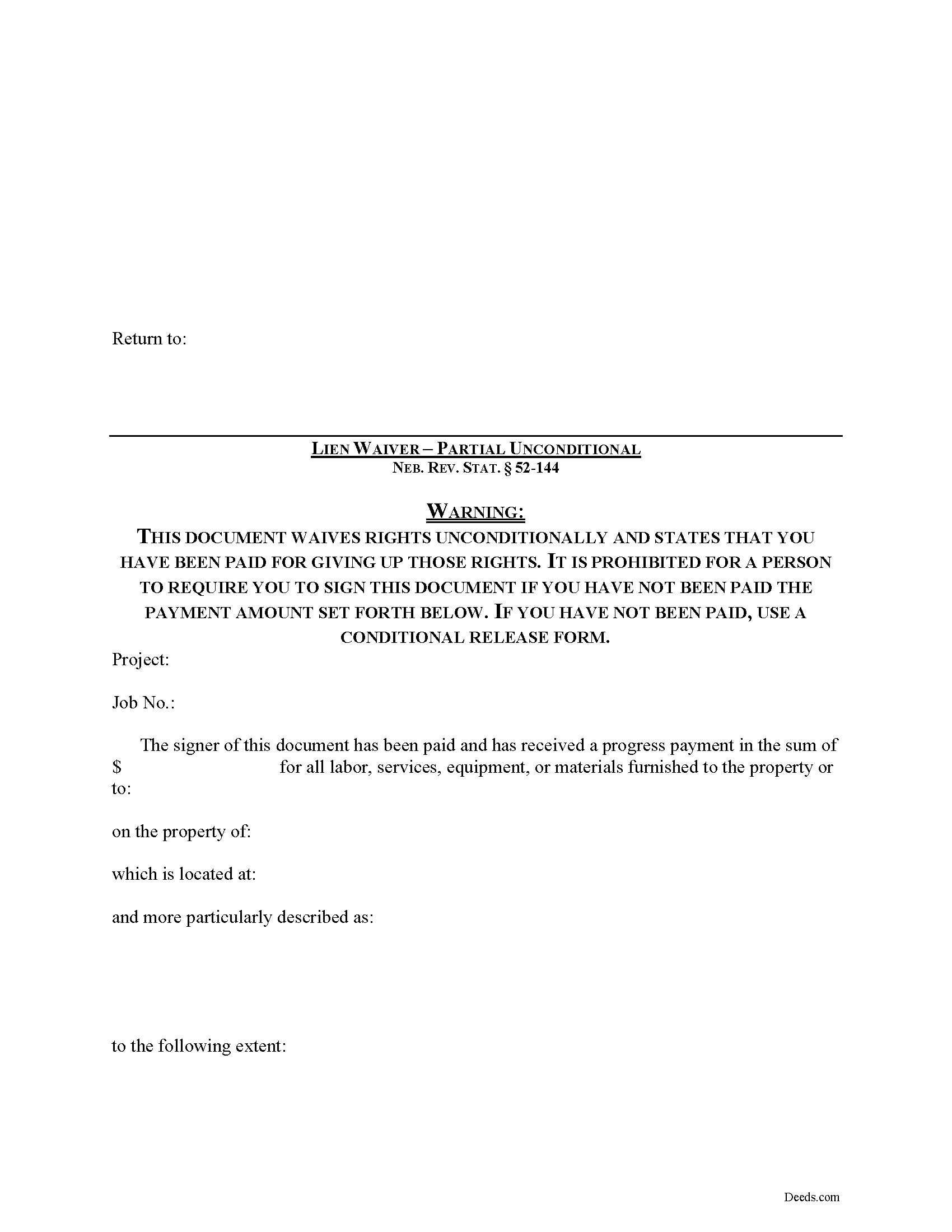
Construction liens are governed under the Nebraska Construction Lien Act, found at Sections 52-125 to 52-159 of the Nebraska Revised Statutes.
The term "waiver" means a voluntary surrender of a legal right. In this case, the person granting the waiver gives up the right to seek a construction lien for all or part of the amount due on an improvement to real property. This assurance is often enough to encourage the other party to pay the outstanding debt.
As set forth by Neb. Rev. Stat. 52-144(2), a written waiver relinquishes all construction lien rights of the claimant as to the improvement to which the waiver relates unless the waiver is specifically limited to a particular lien right or a particular portion of the services or materials furnished. A waiver of lien rights does not affect any contract rights of the claimant otherwise existing. 52-144(3). Acceptance of a promissory note or other evidence of debt is not a waiver of lien rights unless the note or other instrument expressly so declares. 52-144(4).
Expanding on the statute above, Nebraska law generally recognizes four types of lien waivers. These include partial and final waivers. Each waiver can be conditional... More Information about the Nebraska Partial Unconditional Lien Waiver
Final Conditional Lien Waiver
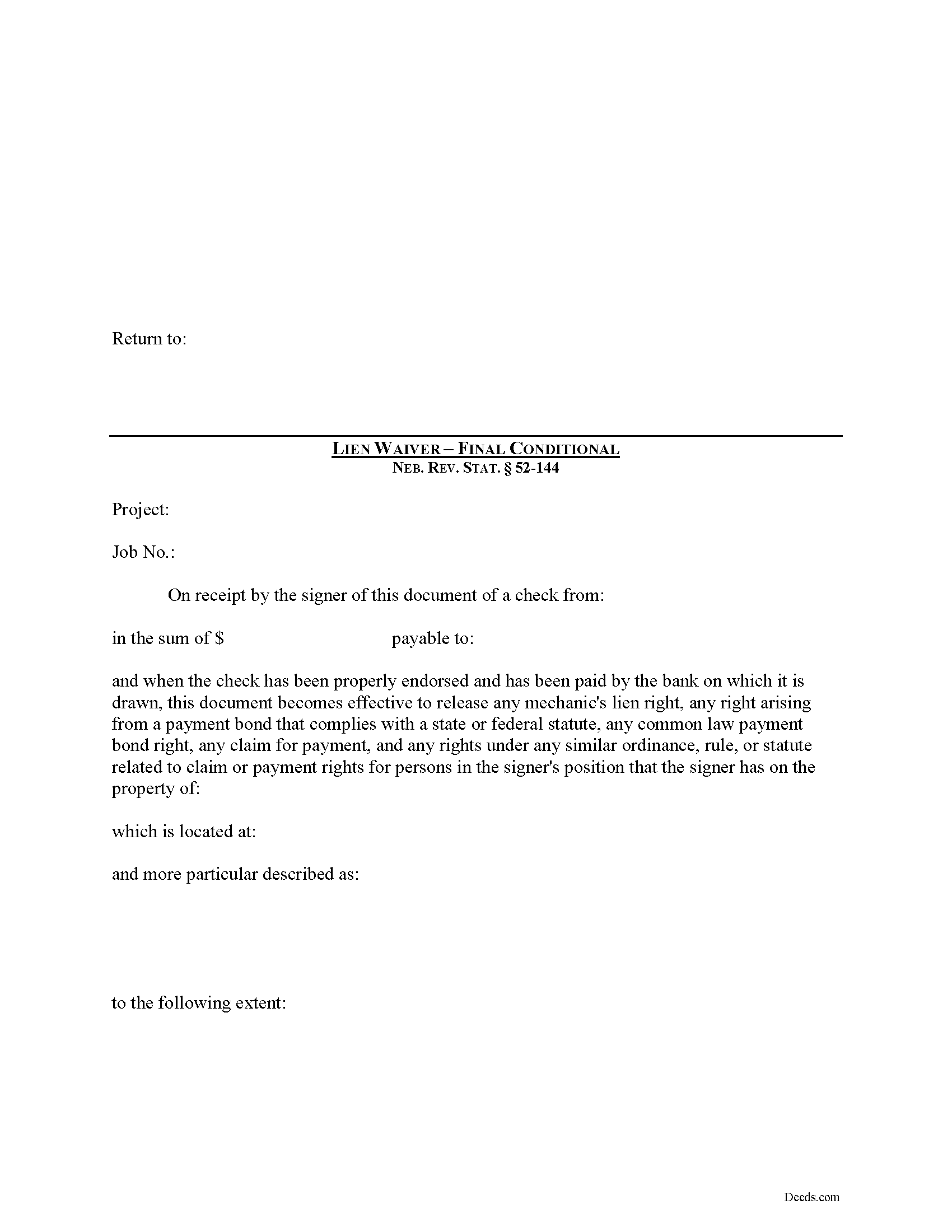
Construction liens are governed under the Nebraska Construction Lien Act, found at Sections 52-125 to 52-159 of the Nebraska Revised Statutes.
The term "waiver" means a voluntary surrender of a legal right. In this case, the person granting the waiver gives up the right to seek a construction lien for all or part of the amount due on an improvement to real property. This assurance is often enough to encourage the other party to pay the outstanding debt.
As set forth by Neb. Rev. Stat. 52-144(2), a written waiver relinquishes all construction lien rights of the claimant as to the improvement to which the waiver relates unless the waiver is specifically limited to a particular lien right or a particular portion of the services or materials furnished. A waiver of lien rights does not affect any contract rights of the claimant otherwise existing. 52-144(3). Acceptance of a promissory note or other evidence of debt is not a waiver of lien rights unless the note or other instrument expressly so declares. 52-144(4).
Expanding on the statute above, Nebraska law generally recognizes four types of lien waivers. These include partial and final waivers. Each waiver can be conditional... More Information about the Nebraska Final Conditional Lien Waiver
Final Unconditional Lien Waiver
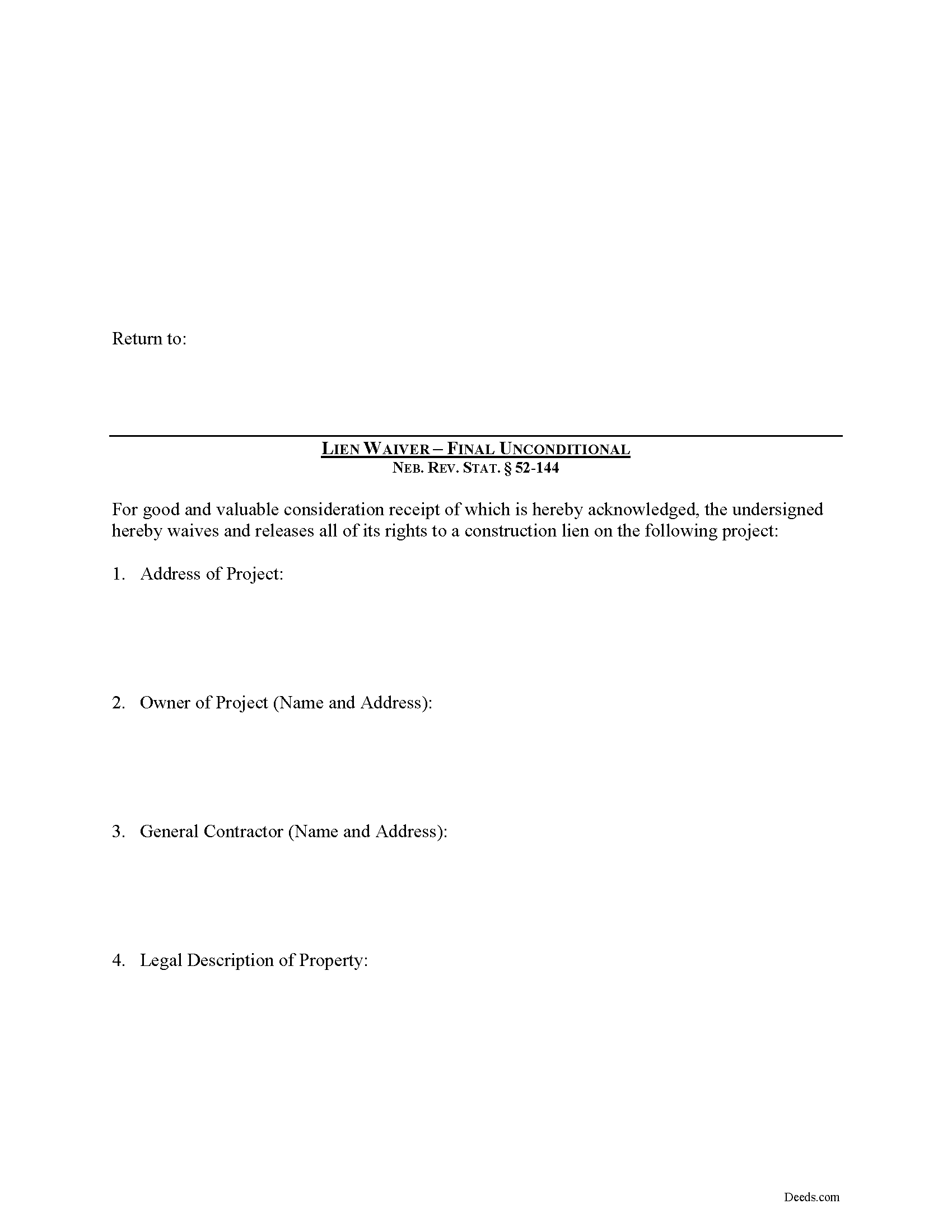
Construction liens are governed under the Nebraska Construction Lien Act, found at Sections 52-125 to 52-159 of the Nebraska Revised Statutes.
The term "waiver" means a voluntary surrender of a legal right. In this case, the person granting the waiver gives up the right to seek a construction lien for all or part of the amount due on an improvement to real property. This assurance is often enough to encourage the other party to pay the outstanding debt.
As set forth by Neb. Rev. Stat. 52-144(2), a written waiver relinquishes all construction lien rights of the claimant as to the improvement to which the waiver relates unless the waiver is specifically limited to a particular lien right or a particular portion of the services or materials furnished. A waiver of lien rights does not affect any contract rights of the claimant otherwise existing. 52-144(3). Acceptance of a promissory note or other evidence of debt is not a waiver of lien rights unless the note or other instrument expressly so declares. 52-144(4).
Expanding on the statute above, Nebraska law generally recognizes four types of lien waivers. These include partial and final waivers. Each waiver can be conditional... More Information about the Nebraska Final Unconditional Lien Waiver
Mineral Deed
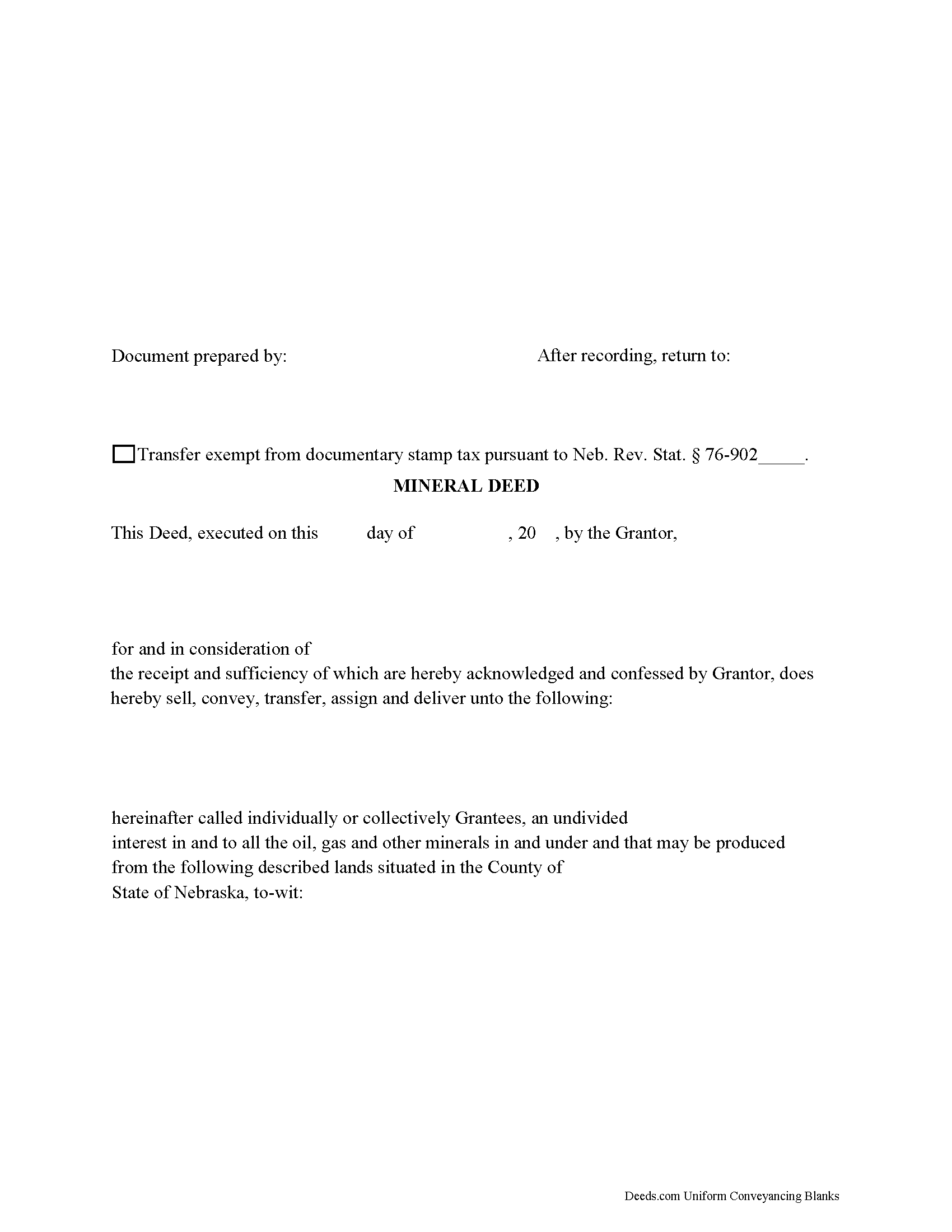
The General Mineral Deed in Nebraska transfers oil, gas, and mineral rights from the grantor to the grantee. THIS IS NOT A LEASE. There are no Exceptions or Reservations included.
The transfer includes the oil, gas and other minerals of every kind and nature. It also transfers any and all rights to receive royalties, overriding royalties, net profits interests or other payments out of or with respect to those oil, gas and other minerals. The Grantor can stipulate the percentage of Mineral Rights the Grantee will receive and is made subject to any rights existing under any valid and subsisting oil and gas lease or leases of record.
This general mineral deed gives the grantee the right to access, for the purpose of mining, drilling, exploring, operating and developing said lands for oil, gas, and other minerals, and storing handling, transporting and marketing of such.
In this document the Grantor Warrants and will defend said Title to Grantee. Use of this document has a permanent effect on your rights to the property, if you are not completely sure of what you are executing seek the advice of a legal professional.
(Nebraska MD Package includes form, guidelines, and compl... More Information about the Nebraska Mineral Deed
Mineral Deed with Quitclaim
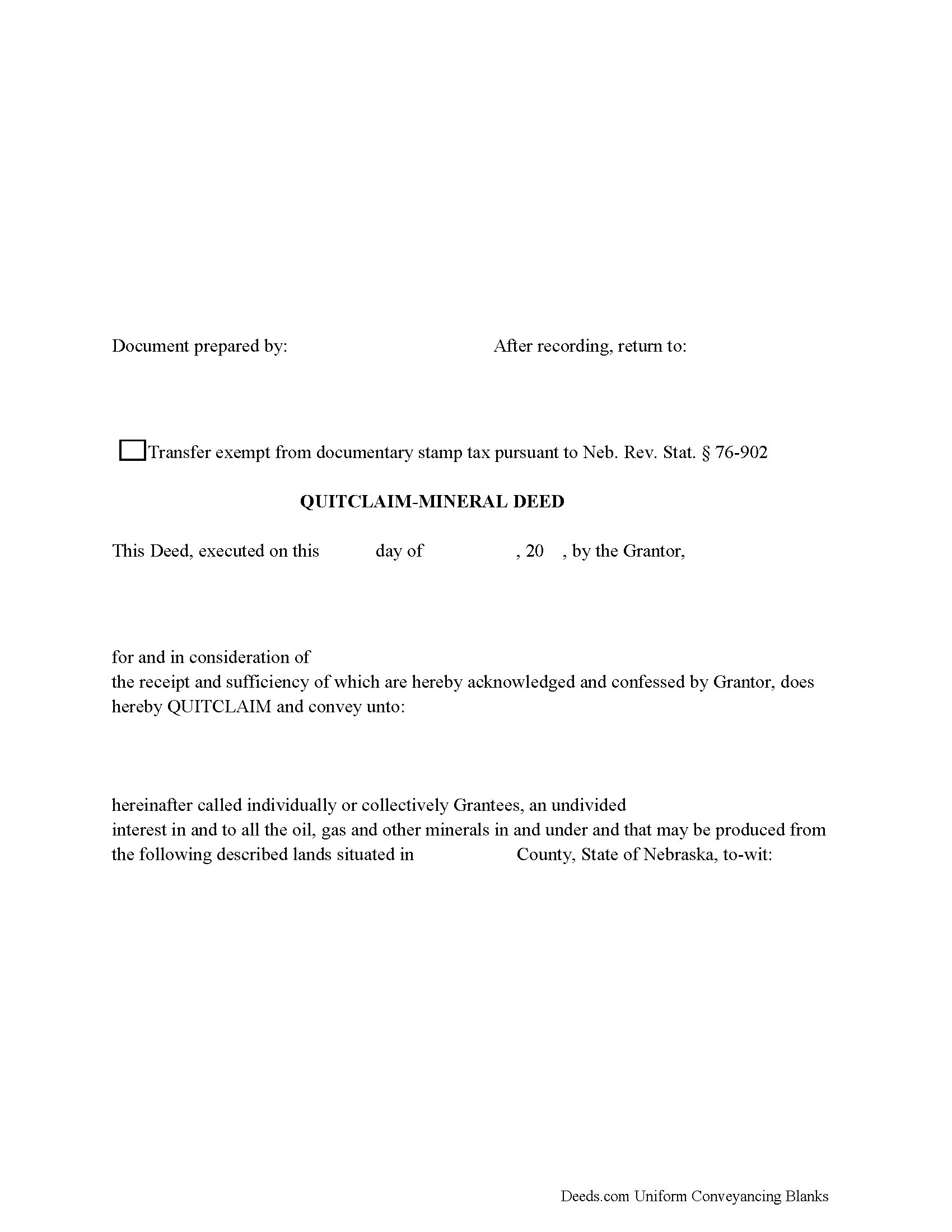
The General Mineral Deed in Nebraska Quitclaims oil, gas, and mineral rights from the grantor to the grantee. THIS IS NOT A LEASE. There are no Exceptions or Reservations included.
The transfer includes the oil, gas and other minerals of every kind and nature. The Grantor can stipulate the percentage of Mineral Rights the Grantee will receive.
This general mineral deed gives the grantee the right to access, for the purpose of mining, drilling, exploring, operating and developing said lands for oil, gas, and other minerals, and storing handling, transporting and marketing of such.
The seller, or grantor Quitclaims the mineral rights and does NOT accept responsibility to any discrepancy of title (This assignment is without warranty of title, either express or implied)
Uses: Mineral deeds with quitclaim are often used in situations where the grantor wants to quickly release any interest they might have in mineral rights, such as in settling estates, resolving disputes, clearing up uncertainties about ownership in a title's history or when mineral rights have previously been severed or fragmented from surface rights and cloud a title, making it difficult to transfer propert... More Information about the Nebraska Mineral Deed with Quitclaim
Deed of Trust
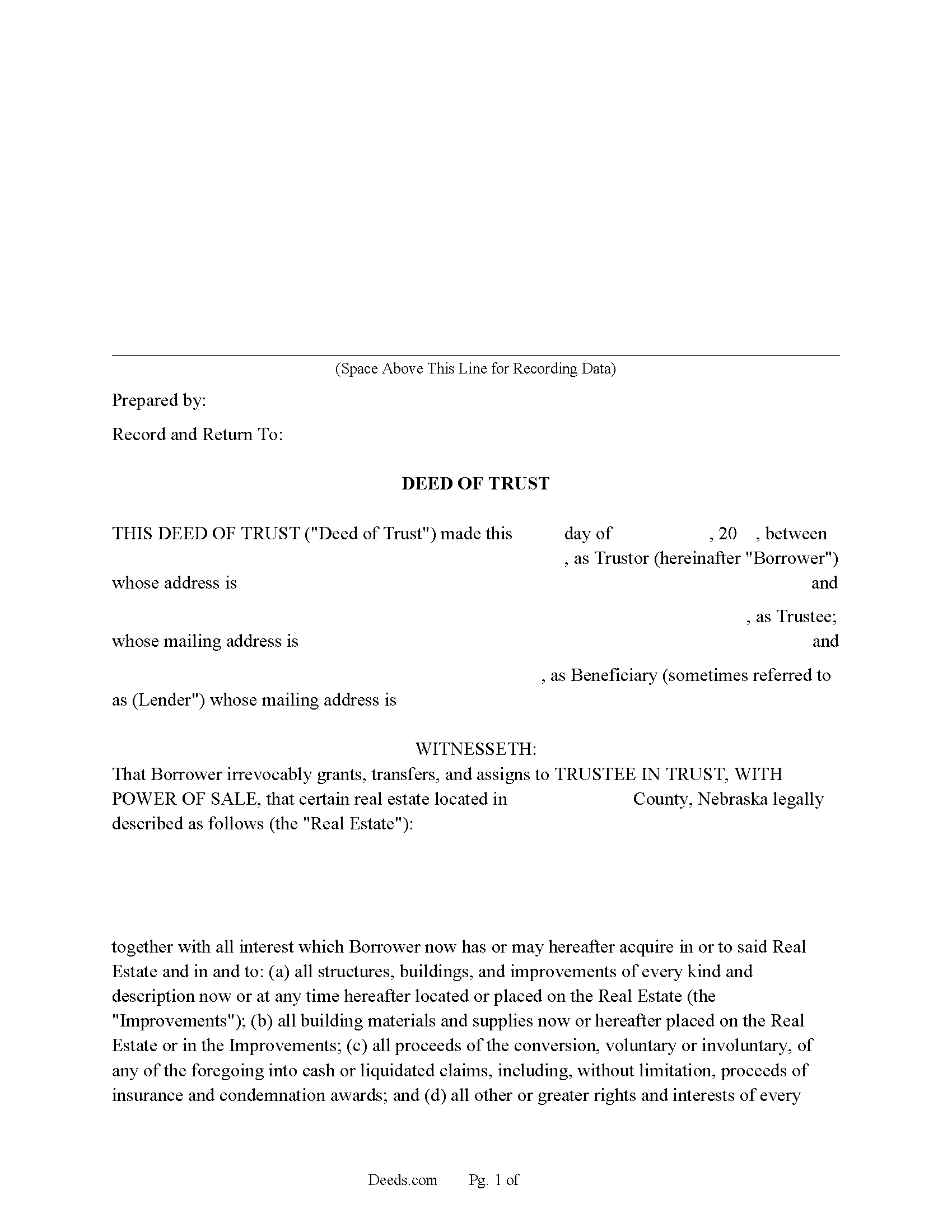
In Nebraska, a Deed of Trust is the most commonly used instrument to secure a loan. Foreclosure can be done non-judicially, saving time and expense. This process is called a Trustee Sale. There is no automatic stay of a trustee's sale under the Nebraska Trust Deeds Act, whereas in a typical judicial foreclosure a borrower would be entitled to a stay of the sheriff's sale for anywhere from three to nine months depending upon the maturity date of the real estate mortgage
There are three parties in this Deed of Trust:
1- The Trustor (Borrower)
2- Beneficiary (Lender) and a
3- Trustee (Neutral Third Party)
76-1003. Trustee; qualification.
(1) The trustee of a trust deed shall be:
(a) A member of the Nebraska State Bar Association or a licensed real estate broker of Nebraska;
(b) Any bank, building and loan association, savings and loan association, or credit union authorized to do business in Nebraska under the laws of Nebraska or the United States or an agency of the United States Department of Agriculture involved in lending;
(c) Any corporation authorized to conduct a trust business in Nebraska under the laws of Nebraska or the United States; or
(d) Any title insurer aut... More Information about the Nebraska Deed of Trust
Assignment of Deed of Trust
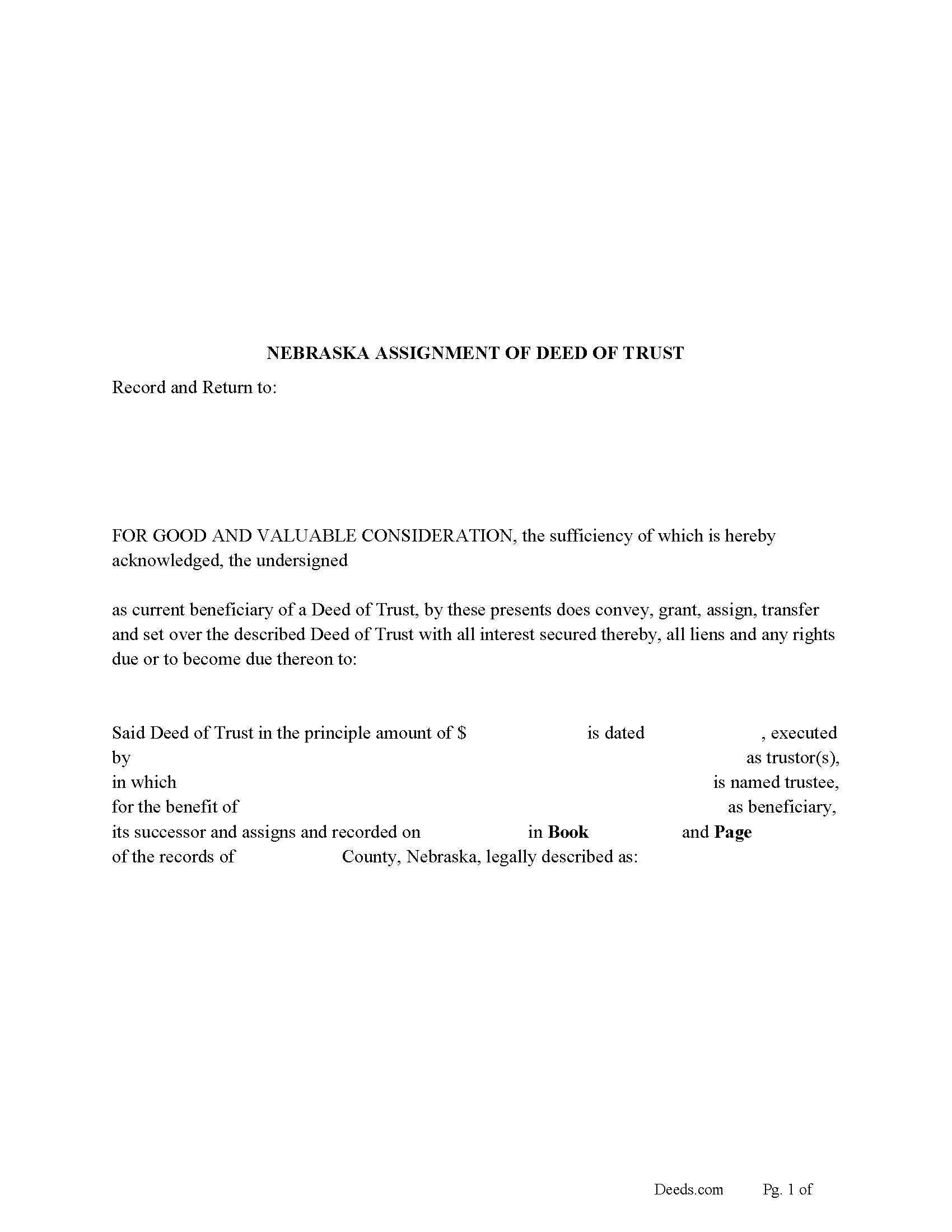
A Deed of Trust assignment, also referred to as an "Assignment of Deed of Trust", occurs when the beneficiary/lender of the loan transfers their loan obligations to a third party. The lender usually assigns a Deed of Trust by selling it to a new bank or lender. This form can be used by the current beneficiary/lender even if the Deed of Trust in question states a different beneficiary/lender.
Current Borrowers must be notified of the assignment. Notification consists of contact information of the new creditor, recording dates, recording instrument numbers, changes in loan, etc. Included are "Notice of Assignment of Deed of Trust" forms.
The Truth and lending act requires that borrowers be notified when their Deed of Trust has been sold, transferred, or assigned to a new creditor. Generally, within 30 days to avoid up to $2,000.00 in statutory damages, plus reasonable attorney's fees. Systematic violations can reach up $500,000.00.
(Nebraska Assignment of DOT Package includes form, guidelines, and completed example) For use in Nebraska only.
... More Information about the Nebraska Assignment of Deed of Trust
Deed of Full Reconveyance for Deed of Trust
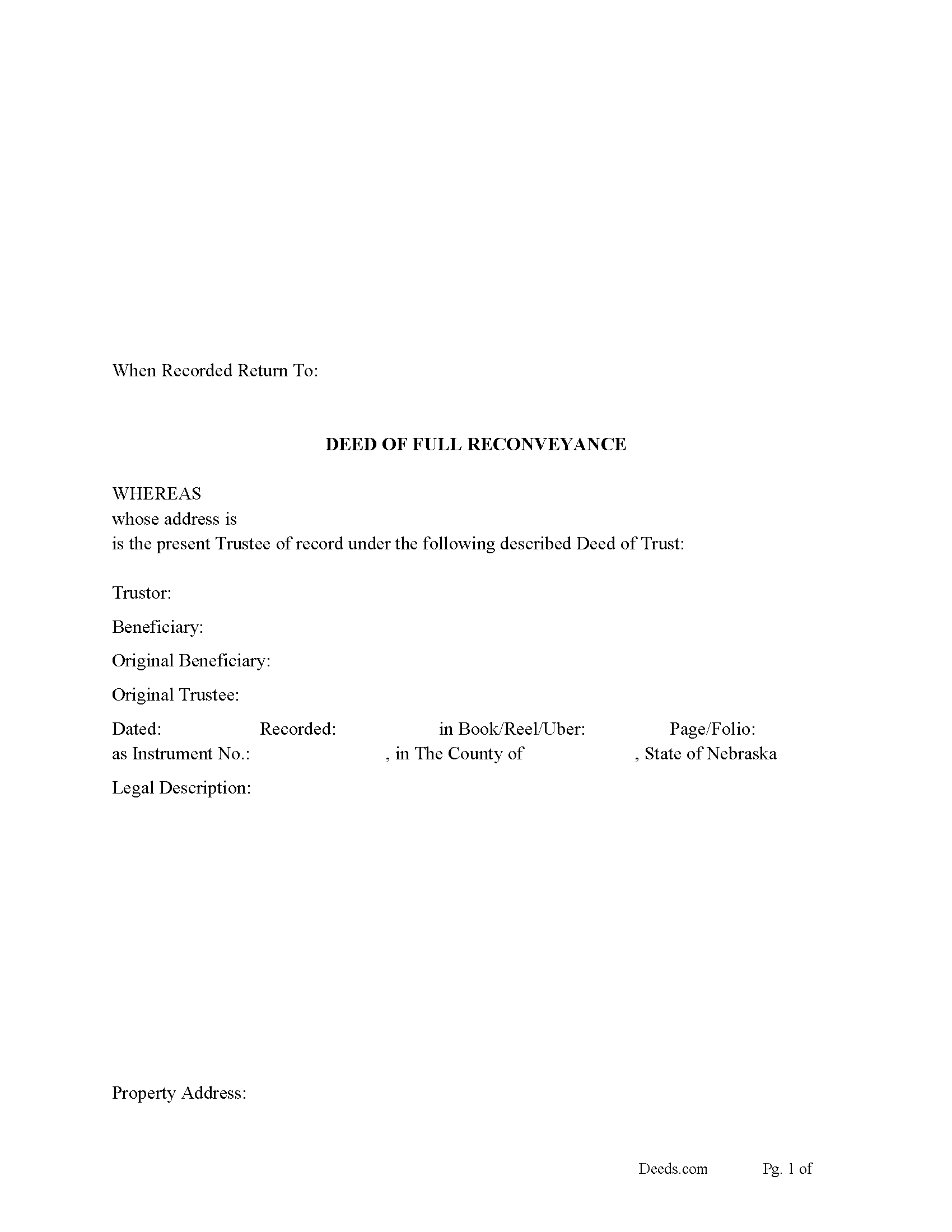
When a Deed of Trust has been paid in full the beneficiary/lender is responsible to deliver (a reconveyance in recordable form duly executed by the trustee) to the trustor/borrower. (Any beneficiary who fails to deliver such a reconveyance within sixty days after receipt of such written request shall be liable to the trustor or his or her successor in interest, as the case may be, for five thousand dollars or actual damages resulting from such failure, whichever is greater.) (76-1014.01)
(If a trustee fails or refuses to execute a reconveyance required by the beneficiary, the beneficiary shall appoint a successor trustee that will execute a reconveyance.) (76-1014.01)
This form can be used by the original beneficiary/lender or current beneficiary/lender- original trustee or current trustee,
(Nebraska DOFR Package includes form, guidelines, and completed example) For use in Nebraska only.
... More Information about the Nebraska Deed of Full Reconveyance for Deed of Trust
Certificate of Trust
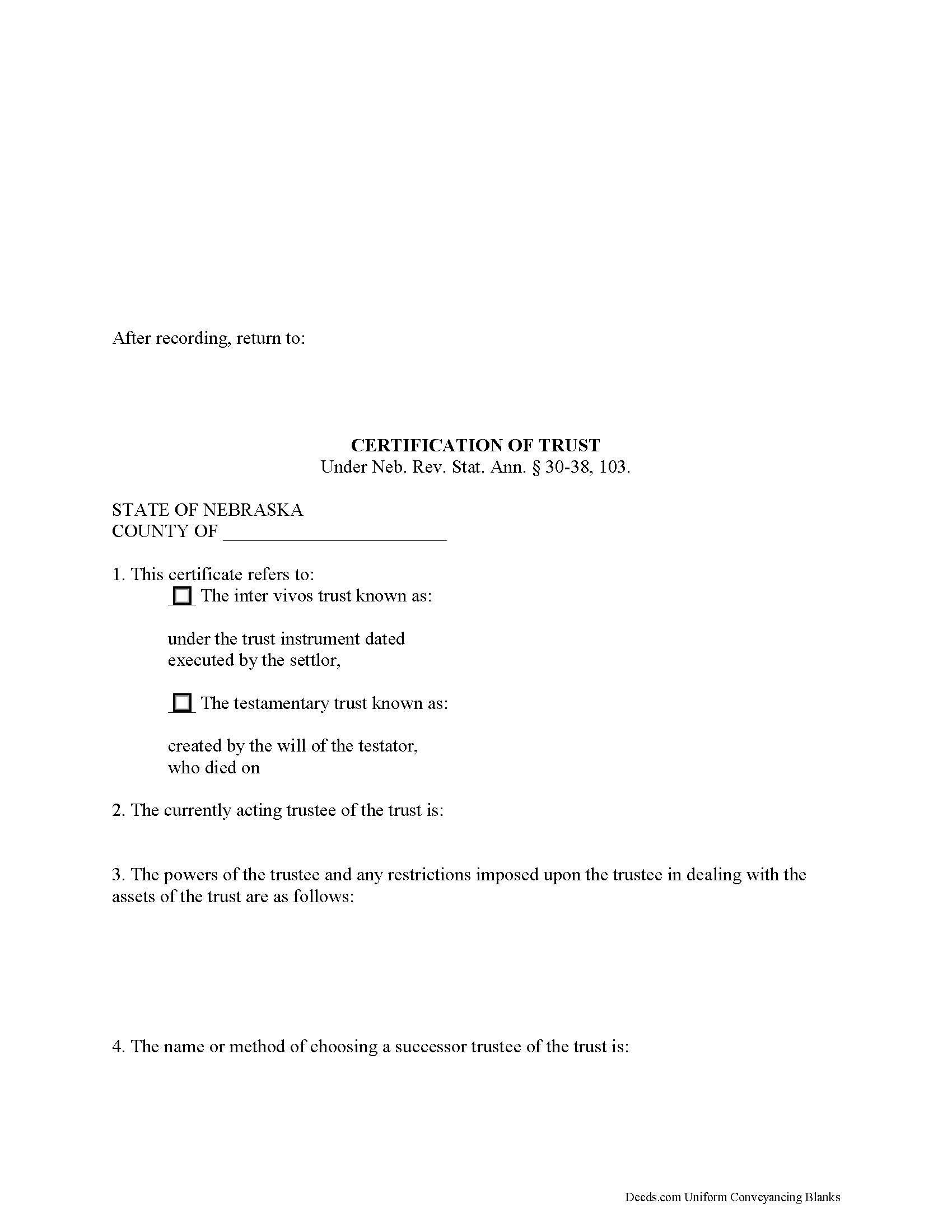
The Nebraska certification of trust is codified at Neb. Rev. Stat. Ann. 30-38, 103 and falls under the Nebraska Uniform Trust Code, a collection of statutes adopted from the Uniform Trust Code to govern trusts in the State of Nebraska.
In Nebraska, the certification of trust is an affidavit signed by each acting trustee of the trust, containing sworn statements made in the presence of a notary public. The certificate verifies the existence of the trust and is an abstract of relevant provisions of the trust in lieu of the entire trust instrument.
The document may be presented by a trustee or requested by any person doing business with a trustee, particularly in transactions involving real property (though failure to request a certificate of trust is not considered an "improper act" under 30-38,106). As the trust itself cannot hold title, the trustee acts as a representative of the trust. When the transaction for which the certificate of trust is presented or requested involves real property, the legal description of the parcel subject to the transaction should be included.
The certificate of trust may be used by trustees of both living trusts and testamentary trusts. F... More Information about the Nebraska Certificate of Trust
Disclaimer of Interest
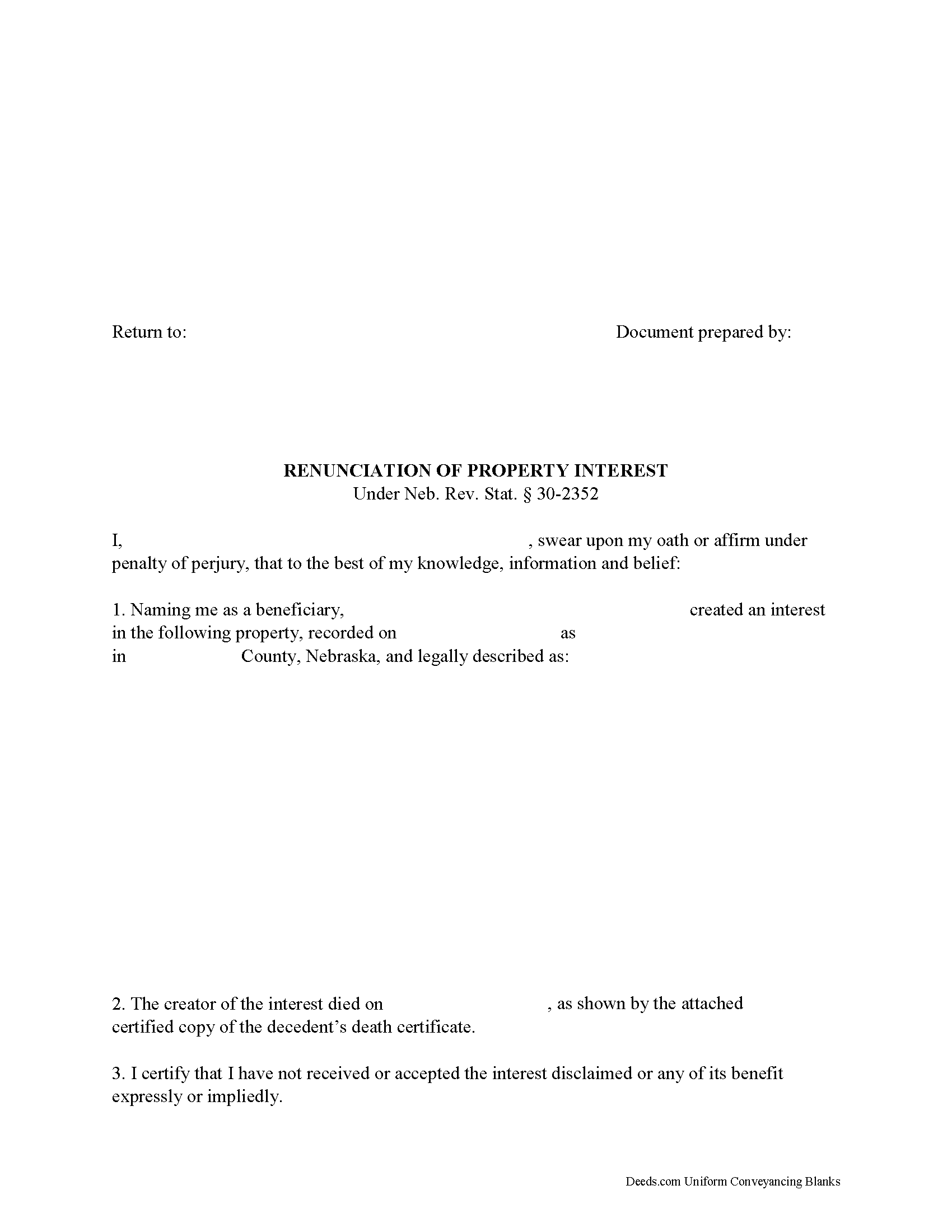
Under the Nebraska Statutes, the beneficiary of an interest in property may renounce the gift, either in part or in full (Neb. Rev. Stat. 30-2352). Note that the option to renounce is only available to beneficiaries who have not acted in any way to indicate acceptance or ownership of the interest.
The instrument of renunciation must be in writing and include a description of the interest, a declaration of intent to renounce all or a defined portion of the interest, and be signed by the renouncing party ( 30-2352 (2)).
Deliver the instrument within nine months of the transfer (e.g., the death of the creator of the interest) to the personal representative of the decedent's estate or the trustee, and file a copy with the court of the county that has or would have jurisdiction over proceedings regarding the estate of the deceased. If real property is involved, a copy of the instrument must be recorded at the office of the Register of Deeds in the county where the property is located in order to avoid any ambiguity in the chain of title ( 30-2352 (3) (b)).
A renunciation is irrevocable and binding for the renouncing party and his or her creditors, so be sure to consult an... More Information about the Nebraska Disclaimer of Interest
Notice of Lis Pendens
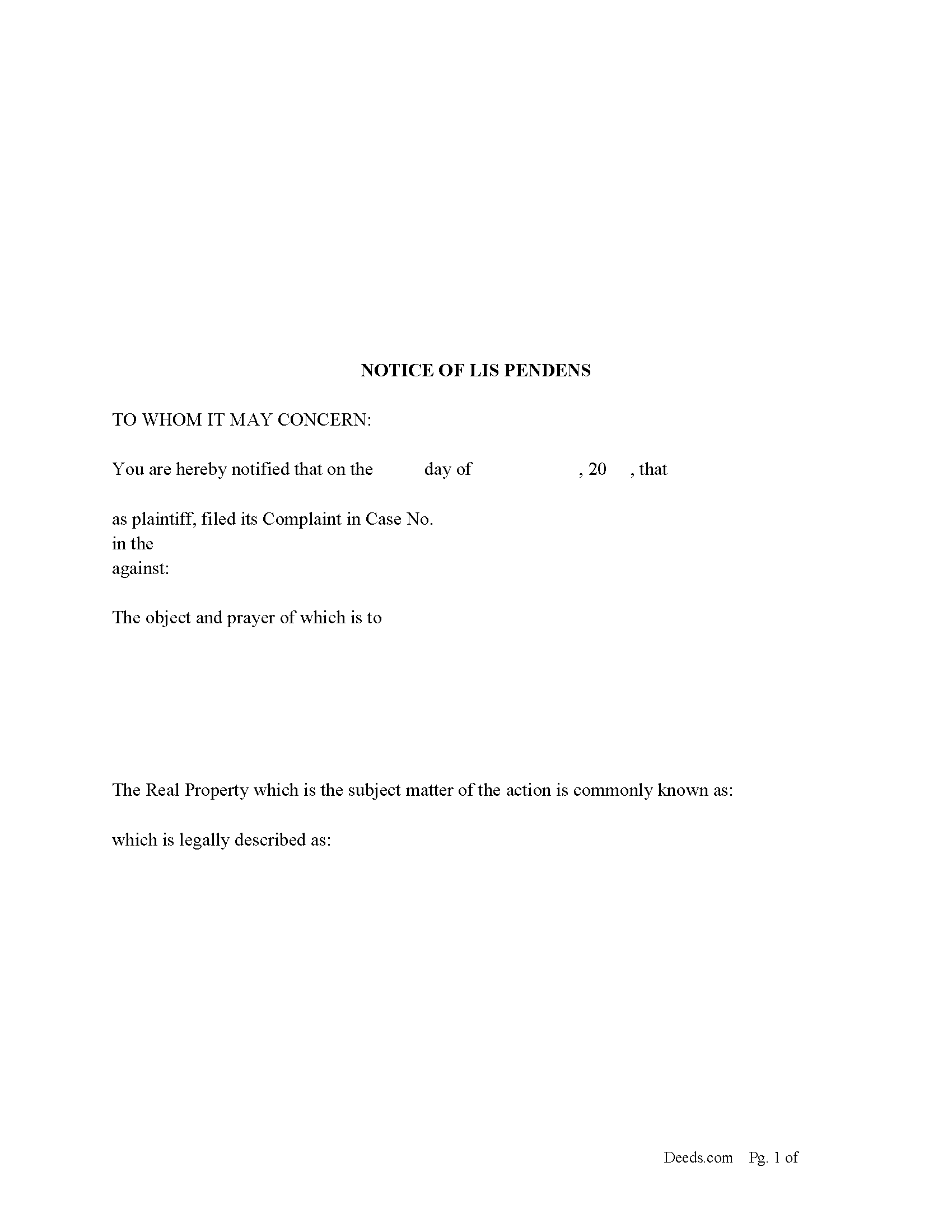
A Lis Pendens Notice is filed when actions are brought that affect title to real property. Typically by the Plaintiff (or in case any defendant sets up an affirmative cause of action and demands relief which shall affect the title to real estate, he or she may, at the time of filing such answer or at any time afterwards, file with the clerk or register of deeds of each county in which the real estate thus to be affected, or any part thereof, is situated, a notice of the pendency of such action.) (NRS. 25-531)
(From the time of filing such notice the pendency of such action shall be constructive notice to any purchaser or encumbrancer to be affected thereby. Every person whose conveyance or encumbrance is subsequently executed or subsequently recorded shall be deemed to be a subsequent purchaser or encumbrancer and shall be bound by all proceedings taken in the action after the filing of such notice to the same extent as if he or she were made a party to the action.) (NRS. 25-531)
(Nebraska Notice of LP Package includes form, guidelines, and completed example) For use in Nebraska only.
... More Information about the Nebraska Notice of Lis Pendens
Release of Notice of Lis Pendens
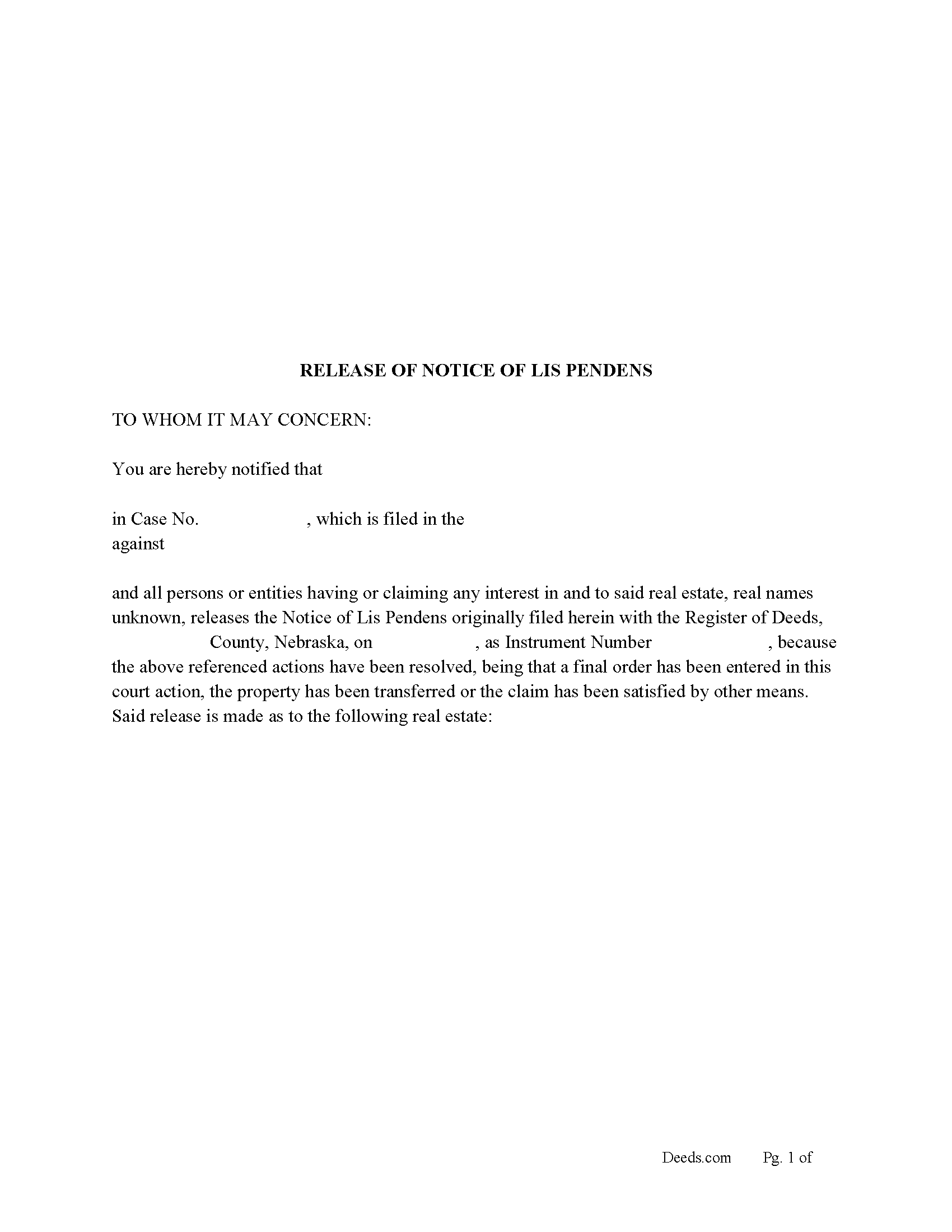
Use this form to release a previously recorded Notice of Lis Pendens.
(At any time after such notice of pendency is recorded, the party on whose behalf the same was filed or the party's attorney of record may cause the notice to be canceled in the office of the county clerk or register of deeds of any county in which the notice has been filed or recorded. Such cancellation may be made by written release in the same manner as such cancellations are entered on order of the court.) (NRS 25-531)
(Nebraska Release of Notice of LP Package includes form, guidelines, and completed example)... More Information about the Nebraska Release of Notice of Lis Pendens